
February, 2025






February, 2025





Sarah Sharp Theophilus
Regardless of your political affiliation, January was a historical month in politics for South Dakotans. Our former Governor Kristi Noem was confirmed as the head of the Department of Homeland Security. Senator John Thune was elected as the Senate Majority Leader and Senator Mike Rounds is Chairing the Armed Services Cybersecurity Subcommittee. Representative Dusty Johnson continues to Chair the panel overseeing rural broadband.
On behalf of the State Bar, I want to thank our colleagues who are serving in the state Legislature and encourage more lawyers to consider helping with legislative activities. Lawyers bring legal experience, knowledge, and problem-solving skills to the Legislature. Our training and background helps us to evaluate the impact of proposed legislation on individuals, businesses, and communities. We are able to advocate for sound, fair, and balanced laws, and to ensure that policies are both effective and just.
Attorneys who are not members of the Legislature can also provide assistance as well, in areas such as drafting bills, providing expert testimony, or advising lawmakers. I would like to thank our Executive Director, Paul Cremer, Strategic Plan Coordinator, Carrie Gonsor Sanderson, and numerous State Bar members for their legislative efforts on behalf of the State Bar.
We are fortunate to have several law-trained colleagues serving in our Legislature, including Sen. Amber Hulse, and Sen. David Wheeler. House members include Jon Hansen (Speaker), John Hughes, Will Mortenson, Scott Odenbach, Matt Roby, Bethany Soye, Mike Stevens, and

to both!
As the President of the State Bar, I respectfully request my colleagues to consider providing some of your time for this meaningful form of public service.
Please reach out to me or State Bar staff if you have any questions about how to get involved.
To that end, I will be volunteering for the 2025 State Bar “Ask-A-Lawyer” program this month being put on by the South Dakota Public Information Committee. This year’s program will be held at the Minnehaha County Courthouse in Sioux Falls on February 12 & 13 from 7-10 p.m. While this program is a great public relations tool for the State Bar of South Dakota, it provides a valuable legal service to the people of South Dakota. Lawyers at calling centers in Sioux Falls and Rapid City answer toll-free phone calls from people across the State. Typically, 1,000 calls are received. General legal information and referral services are given. Both the attorneys and the callers remain anonymous. Prior to and during the event, toll-free numbers are advertised throughout the State.
I hope you will continue to support this program and volunteer to staff the telephone lines. Your participation is important and greatly appreciated. You can reach out to myself or Brooke Schmidt at bschmidt@dehs.com if you are interested in volunteering. We look forward to working with you to make the 2025 “Ask-a-Lawyer” program a success.


The YLS Board is getting ramped up for exciting things in the beginning of 2025.
As this article comes out, our at-large YLS Board Representative, Cole Romey, will be traveling to Phoenix, Arizona, for the ABA Young Lawyer Division’s Midyear Assembly Meeting. The YLS Board members appointed Cole to be the ABA Young Lawyer Division representative for a two-year term. As part of his duties, Cole will represent South Dakota and North Dakota’s interests during the YLD House of Delegates meetings where the group formulates the policies of the ABA and elects ABA officers and the Board of Governors for the YLD. We are very excited for Cole and know he will represent our Board, bar association, and state well. Watch for updates next month about the YLD Delegate Meeting and other notable things from the YLD Midyear Assembly!
Spring will also bring the annual YLS Bootcamp. The Bootcamp will be held in April in Sioux Falls this year with a mixer to follow. There will also be a watch party in Rapid City with a mixer to follow as well. The Bootcamp committee has been working hard to secure a variety of speakers and topics that will be applicable to young and experienced attorneys across the state. Stay tuned for more information!
As always, if anyone has questions, concerns, or ideas for the YLS Board, please feel free to reach out to me at Chelsea.Wenzel@state.sd.us or any of the YLS Board Members (contact information available on the State Bar website).

President: Chelsea Wenzel
President-Elect: Mae Pochop
Secretary/Treasurer: Lora Waeckerle
First Circuit Rep: Derrick Johnson
Second Circuit Rep: Tyler Bradley
Third Circuit Rep: Stacia Jackson
Fourth Circuit Rep: Ryan Walno
Fifth Circuit Rep: Rebecca Ronayne
Sixth Circuit Rep: Stephen Gemar
Seventh Circuit Rep: Olivia Edoff
At-Large Rep: Cole Romey
your
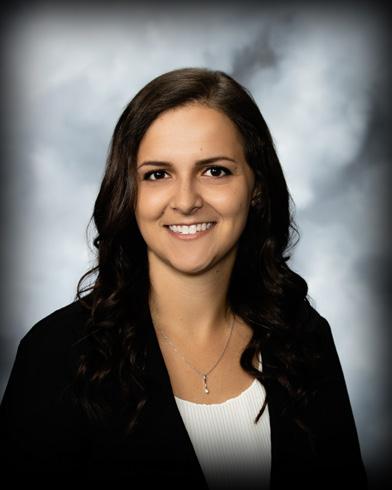

Rebecca Ronayne 5th Circuit Representative
YLS Board Spotlight: Rebecca Ronayne, Fifth Circuit Representative
1. Where you grew up: Aberdeen, SD.
2. Where you work: Ronayne Law Office, P.C. in Aberdeen, SD
3. Practice area: Real estate, estate planning, probates, personal injury.
4. Pump up song: Make Me Proud by Drake
5. Tell us about your family. Proud childless cat lady here – I have two cats, Lola and Zara.
6. If you could have any superpower, what would it be? I would love to be able to travel by floo powder like in Harry Potter. I’d be able to fit in so many more vacations!
7. How did you start getting involved with YLS? I was approached by then Second Circuit Representative for YLS, Brooke Schmidt. Brooke and I grew up together in Aberdeen and there was a vacancy on the board for the Fifth circuit.
8. What is some advice you wish you had 5 years ago? The first few years of practicing might be rough, but keep your head up and keeping trudging along. I promise it gets better!
9. Do you have any advice for experienced attorneys? Apply to be a mentor! The transition from law school to practicing is difficult and, as a young lawyer, even just knowing you have someone you can reach out to provides some reassurance. Not only will mentoring be beneficial to the young lawyer, but also to the practice of law and the state bar.
10. Advice for newer attorneys? Get involved in the state bar. It was intimidating not being a USD law graduate, but it is one of the best decisions I have made in my career. You will make a lot of friends going through similar experiences and you will gain many connections around the state!
11. Who has been your most influential mentor so far? It is hard to pick just one. Obviously, I wouldn’t be where I am without my dad – he has gotten really good at reassuring me things aren’t as big of a deal as I often think they are! Rory King and Matt Tysdal have also been great resources for me outside of my office. They have both been incredibly supportive and happy to answer any questions I may have.
12. What is your dream vacation? After living there for two years and countless trips, Spain will always be my dream vacation.


Ryan Walno 4th Circuit Representative
1. Where you grew up: On a cattle ranch outside Cheyenne, Wyoming
2. Where you work: Kinney Law Firm in Spearfish, South Dakota
3. Practice area: Criminal Defense
4. Pump up song: Bulls on Parade by Rage Against the Machine
5. Tell us about your family. My father is retired Airforce who runs a drug testing company in the Black Hills, my mother is a pharmacist, and my brother is a police officer.
6. If you could have any superpower, what would it be? The ability to teleport would make getting to court far easier.
7. How did you start getting involved with YLS? The Waeckerles forced me into it against my will. (Joking, but they introduced me to the Young Lawyer Section).
8. What is advice you wish you had 5 years ago? Go to medical school and invest in bitcoin.
9. Do you have any advice for experienced attorneys? Never underestimate the importance of mentorship. It makes a big difference.
10. Advice for newer attorneys? You are going to make mistakes; that's how you become better.
11. Who has been your most influential mentor so far? My mentor in law school taught me that the key to survival in this profession is understanding it's inevitable that you are going to upset judges and other attorneys in your career, but NEVER upset your paralegal or the clerks.
12. Interests/hobbies outside the law. I enjoy Four Wheeling , The Colorado Avalanche, and Golf
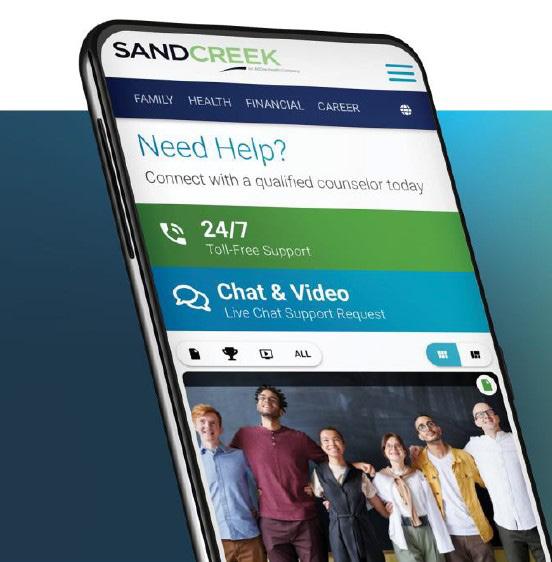
The State Bar is providing expanded wellness member benefits through our EAP provider, Sand Creek.
These benefits are available to ALL State Bar members and their household family members, and to USD Law students and their household family members.
Please take advantage of these expanded wellness benefits.
March 18, 2025
12:30 - 1:30 CST
Topic: How To Get Involved With
The State Bar

Tamara Nash Chair:
I DO SOLEMNLY SWEAR, OR AFFIRM, THAT:
I WILL SUPPORT THE CONSTITUTION OF THE UNITED STATES AND THE CONSTITUTION OF THE STATE OF SOUTH DAKOTA;
I WILL MAINTAIN THE RESPECT DUE TO COURTS OF JUSTICE AND JUDICIAL OFFICERS;
I WILL NOT COUNSEL OR MAINTAIN ANY SUIT OR PROCEEDING WHICH SHALL APPEAR TO ME TO BE UNJUST, NOR ANY DEFENSE EXCEPT SUCH AS I BELIEVE TO BE HONESTLY DEBATABLE UNDER THE LAW OF THE LAND;
I WILL EMPLOY FOR THE PURPOSE OF MAINTAINING THE CAUSES CONFIDED TO ME SUCH MEANS ONLY AS ARE CONSISTENT WITH TRUTH AND HONOR, AND WILL NEVER SEEK TO MISLEAD THE JUDGE OR JURY BY ANY ARTIFICE OR FALSE STATEMENT OF FACT OR LAW;
I WILL MAINTAIN THE CONFIDENCE AND PRESERVE INVIOLATE THE SECRETS OF MY CLIENT, AND WILL ACCEPT NO COMPENSATION IN CONNECTION WITH A CLIENT'S BUSINESS EXCEPT FROM THAT CLIENT OR WITH THE CLIENT'S KNOWLEDGE OR APPROVAL;
I WILL ABSTAIN FROM ALL OFFENSIVE PERSONALITY, AND ADVANCE NO FACT PREJUDICIAL TO THE HONOR OR REPUTATION OF A PARTY OR WITNESS, UNLESS REQUIRED BY THE JUSTICE OF THE CAUSE WITH WHICH I AM CHARGED;
I WILL NEVER REJECT, FROM ANY CONSIDERATION PERSONAL TO MYSELF, THE CAUSE OF THE DEFENSELESS OR OPPRESSED, OR DELAY ANY PERSON'S CAUSE FOR LUCRE OR MALICE.
Sustaining Life Fe�low - $50,000 plus Fe�lows of the South
Fred & Luella Cozad
Thomas C. Barnett, Jr.
Robert E. Hayes
Scott N. Heidepriem
Andrew J. Knutson
David L. Knudson
Robert A. Martin
Kimberley A. Mortenson
Frank L. Farrar
Gregory A. Yates
Life Fe�low - $25,000 plus Diamond Fe�lows - $10,000 plus Platinum Fe�lows - $10,000
Hon. Richard H. Battey
Melissa Nicholson Breit
P. Daniel Donohue
Chet Groseclose
Hon. John B. Jones
Jerome B. Lammers
Scott C. Moses
Charles L. Riter
William Spiry
Hon. Jack R. Von Wald
Gold Fe�lows - $5,000
Renee H. Christensen
Richard A. Cutler
William F. Day, Jr.
Dana J. Frohling
David J. King
Richard L. Kolker
Kimberley A. Mortenson
Timothy J. Rensch
Michael Sharp
Neil Fulton
Hon. Bobbi J. Rank
Timothy J. Rensch
Lori D. Skibbie
John P. Blackburn
Heather Lammers Bogard
Richard D. Casey
Hon. Michael Day
Robert B. Frieberg
Thomas H. Frieberg
William C. Garry
David A. Gerdes
Hon. David R. Gienapp
Patrick G. Goetzinger
G. Verne Goodsell
Robert E. Hayes
Terry L. Hofer
Steven K. Huff

Presidential Fe�lows - $10,000
Carleton R. “Tex” Hoy
Hon. Charles B. Kornmann
Lisa Hansen Marso
Bob Morris
Thomas J. Nicholson
Gary J. Pashby
Stephanie E. Pochop
Reed A. Rasmussen
Pamela R. Reiter
Robert C. Riter, Jr.
Eric C. Schulte
Jeffrey T. Sveen
Charles M. Thompson
Richard L. Travis
Thomas J. Welk
Terry G. Westergaard
Silver Fe�lows - $1,000 (per year) Fe�lows - $500 (per year)
Hon. John Bastian
Hon. John L. Brown
Mary Jane Cleary
Paul L. Cremer
Andrew L. Fergel
Michael S. Fischer
Tom E. Geu

Craig A. Kennedy
Denise Langley
Hon. Judith K. Meierhenry
Hon. Robert A. Miller
Robert C. Riter, Jr.
Jason R.F. Sutton
Lea Wroblewski
Raising the Bar: Our Profession. Our Responsibility.



Two recent announcements by the South Dakota Supreme Court offer exciting avenues of change in South Dakota's bar admission process. I want to talk a bit about both in this month's column and encourage everyone to read more about these opportunities and provide your input about them. It is critical that our bar admissions process is rigorous and reliable to protect the public while aligning that assessment as best we can with the realities of substantive and procedural skill that lawyers use in practice. We certainly will never develop a perfect system of bar admission, but it is important to perpetually re-evaluate and refine our approach. These proposals are key steps in doing just that.
The first announcement is a set of proposed rules to implement a public service pathway pilot program. These will be considered at a hearing on February 18th in Pierre. I encourage everyone to look at the rules and supporting documentation on the Supreme Court's website: https://ujs.sd.gov/Information/ pressreleasesitem. These proposed rules are the product of two years of study and discussion by a bar admission task force that recommended the development of a pilot program to encourage public service and an implementation committee that worked from that report to develop these rules.
The proposed rules would create a five-year pilot program for up to ten USD Law students per year who are committed to public service or rural practice. These students would spend their fifth semester of law school in an approved, full-time, public service placement.
Initially those placements will be in state’s attorney and public defender offices in larger counties. This will allow the Law School to build from existing clinical programs in those offices and learn from those experiences. Students will be required to document at least 500 hours of work and produce a portfolio of written work and oral advocacy that will be evaluated by the South Dakota Board of Bar Examiners for demonstration of minimum competence. The law school will simultaneously assess this and other work on a pass/fail basis to award academic credit for the semester. This is like the system that the University of New Hampshire and its Board has used for more than a decade in their successful Daniel Webster Scholars program. The program will only be available to current and future Law students, not those who have already graduated or attempted the bar exam.
Once participating students successfully complete their full semester placement, they will complete their last semester of law school. Pending successful passage of the MPRE and character and fitness review by the Board of Bar examiners, they will be eligible for admission to the South Dakota bar upon graduation. They will be required to complete a public service commitment of two or three years, however. This provides a return on the investment of the Board, the host entity, the Law School, and many others and will hopefully incentivize the students to make public service their permanent career. If the applicant does not complete the public service commitment, the Board can waive that requirement if the applicant demonstrates hardship or that the placement ended for circumstances not within
their control like a loss of funding. If an applicant simply does not complete their obligation, the board can claw back their admission and require that applicant to sit for the bar exam.
South Dakota is not the only jurisdiction considering a path alternative to the traditional bar examination. New Hampshire has successfully utilized the Daniel Webster Scholars program for almost fifteen years. Oregon has adopted rules and is using a portfolio review program for applicants. Other jurisdictions are in various stages of evaluating or implementing similar programs. South Dakota is the only jurisdiction that expressly ties their alternative admission pathway to public service. This can make the path to a public service career more inviting and accessible, while still ensuring that those lawyers are admitted in this way demonstrate competence.
The second exciting announcement by the South Dakota Supreme Court is that South Dakota will adopt the NextGen Bar Exam for the July 2027 examination. Thirty jurisdictions have announced adoption of NextGen at various administrations between 2026 and 2028. All the states adjacent to South Dakota except Montana have announced their adoption of NextGen.
NextGen was the product of a multiyear study by the National Conference of Bar Examiners to identify the knowledge of substance and skill the new lawyers most use and need and how to align testing more effectively with practice realities. It moves away from the 200 question MBE towards questions that use libraries of fact and law and ask applicants to work through a series of legal questions based on that library. NextGen deemphasizes memorization and arcane exceptions to rules to focus on core doctrine and the ability of applicants to use legal skills like research and writing. I believe that the current bar examination is fair and effective, but that NextGen can be even better.
South Dakota has participated in two rounds of pilot testing of this exam with recent graduates who could compare NextGen and the current bar examination. A consistent theme of the comments from these students has been that NextGen has more similarity to their experience in internships, externships, or postgraduation placement. In other words, it delivers on the promise of exam that is better aligned with practice. They also reported that the exam aligned better with their general law school instruction and relied less on
specialized instruction on test taking strategies. I believe that better alignment with practical legal instruction and the reality of legal practice is a good thing. There are significant technical issues in the computer-based testing platform that NCBE must resolve between now and going live. I am hopeful of their ability to do so and extremely helpful about the examination itself.
Bar admission is a complicated and sometimes controversial topic. I deeply appreciate everyone who takes time to look at these and other issues around bar admission, to ask questions, and provide their input. Wholesale rejection of the bar exam as unnecessary or insuperably unfair is not the answer. Likewise, rejecting any change because “we have always done it this way,” or because any change carries uncertainty is not the answer either. The answer for us as a profession is to commit to the fundamental premise that admission to the bar is a privilege, not a right. Accordingly, it requires a rigorous assessment program. We must commit to the ongoing process of reevaluating and refining our professional admission processes to make them more reliable, more efficient, and more effective. I believe that both recent announcements by the South Dakota Supreme Court are important steps in doing just that. I hope that all of you take time to look at these developments and share your thoughts and questions.

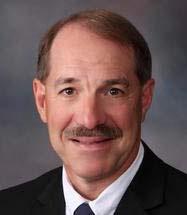
I, ________________________________________________, an active member of the State Bar of South Dakota, do hereby apply for Pro Bono Emeritus Status, for the year 2025.
I understand that if approved, rather than pay regular dues for the year 2025, I will only be required to tender the sum of $125 (same as inactive dues) but I will be entitled to all the rights and privileges of an active member of the State Bar.
Further, I recognize that this status means that I will be requested from time to time to take a referral from East River Legal Services, Dakota Plains Legal Services, or Access to Justice, and I am willing to accept at least one referral in the year 2025.
Finally, I acknowledge that pursuant to the Pro Bono Emeritus Status, I have retired from the active practice of law and I cannot accept private clients, cases for friends or relatives (even if no fee is charged) and that my practice is limited to such referral cases as I accept from the Legal Services Programs, Access to Justice or a non-profit specifically approved by the State Bar. In the event that I decide to accept cases other than those referred to me and which I accept, that I will tender regular active dues and withdraw from the Pro Bono Emeritus Status Program.
Dated this ___ day of _______________________________, 20____
Attention, legal masterminds!
We're seeking volunteers for our committees. If you're ready to bring your skills and insights to the table, we need you! Please fill out the 2025 SBSD Committee Selection survey to sign up for bar committees. All are welcome to join a committee.
https://www.surveymonkey.com/r/2025SBSDCommittees





HERO
apersonwhois admiredoridealized forcourage, outstanding achievements,or noblequalities



Cutler Law Firm, LLP is pleased to announce
Tanner J. Fitz has become a partner in the firm.
Cutler Law Firm, LLP
140 N. Phillips Ave., 4th Floor Sioux Falls, SD 57104
Telephone: (605) 271-4949
Email: TannerF@cutlerlawfirm.com
www.cutlerlawfirm.com
Mark O’Leary is pleased to announce that his daughter
Katie O’Leary has joined him in the practice of law.
O’Leary Law Firm
3500 S. Phillips Ave., Ste 118 Sioux Falls, SD 57105
Telephone: 605-334-4506
Email: katie@olearylawoffice.com
Boyce Law Firm, L.L.P. is pleased to announce
David J. Hieb has become a partner in the firm.
Boyce Law Firm, L.L.P.
300 S. Main Avenue
P.O. Box 5015
Sioux Falls, SD 57117-5015
Telephone: (605) 336-2424
www.boycelaw.com
Myers Billion, LLP is pleased to announce
Aaron Gehrke as an associate attorney.
Myers Billion, LLP
230 S Phillips Ave, Suite 300 Sioux Falls, SD 57104
Telephone: (605) 336-3700
Email: agehrke@myersbillion.com myersbillion.com

The Law Office of Clayborne, Loos and Sabers, LLP announces the following changes to its name and firm membership.
We are pleased to welcome Hollie L. Smith as a partner. Effective January 1, 2025, the firm will be known as Loos, Sabers & Smith, LLP.
Courtney R. Clayborne will serve as Of Counsel in the firm.
2834 Jackson Blvd, Suite 201 Rapid City, SD 57702 (605) 721-1517 www.clslawyers.net
Thompson Law, PLLC is pleased to announce
Clint Fischer has joined the firm.
Thompson Law, PLLC 5027 South Western Avenue
Sioux Falls, SD 57108
Telephone: (605) 362-9100
Email: clint@cathompsonlaw.com
www.cathompsonlaw.com
Beardsley Jensen & Lee is pleased to announce
Conor P. Casey has become a partner in the firm.
4200 Beach Drive, Suite #3 PO Box 9579
Rapid City, SD 57702
Email: ccasey@blackhillslaw.com
Meierhenry Sargent LLP is pleased to announce
Erin E. Willadsen has become a partner in the firm.
Meierhenry Sargent LLP 315 S. Phillips Avenue Sioux Falls, SD 57104
Telephone: (605) 336-3075
Email: Erin@meierhenrylaw.com www.meierhenrylaw.com
Burd, Landeen, & Carper, Attorneys at Law is pleased to announce
Tiffani K. Landeen as partner in the firm.
Burd, Landeen, & Carper, Attorneys at Law 4900 East 57th Street, Suite A
Sioux Falls, SD 57108
Telephone: (605) 332-4351
Fax: (605) 334-6844
Email: tiffani@burdandlandeen.com
Burd, Landeen, & Carper, Attorneys at Law is pleased to announce
Mary H. Burd as partner in the firm.
Burd, Landeen, & Carper, Attorneys at Law 4900 East 57th Street, Suite A
Sioux Falls, SD 57108
Telephone: (605) 332-4351
Fax: (605) 334-6844
Email: mary@burdandlandeen.com
Burd, Landeen, & Carper, Attorneys at Law is pleased to announce
Nichole A. Carper as partner in the firm.
Burd, Landeen, & Carper, Attorneys at Law 4900 East 57th Street, Suite A Sioux Falls, SD 57108
Telephone: (605) 332-4351
Fax: (605) 334-6844
Email: nichole@burdandlandeen.com

The Hagemann-Morris Young Lawyer Mentorship Coin Program strives to foster mentorship within the State Bar by pairing members of the Young Lawyers Section with Mentors who can provide candid and insightful guidance to Young Lawyers as they navigate the beginning stages of their legal career. The Program hopes to:
• Foster the development of the Young Lawyers practical skills and their knowledge of legal customs;
• Create a sense of pride and integrity in the legal profession;
• Promote collegial relationships among legal professionals;
• Improve legal ability and professional judgment; and
• Encourage the use of best practices and highest ideals in the practice of law.
State Bar members are members of the Young Lawyers Section until they reach age 40 or have practiced law for ten years, whichever occurs later.
1. Young Lawyers and Mentors sign up with the State Bar by completing the online forms linked below.
2. The YLS Board establishes a compatible mentorship pair.
- The YLS Board creates mentorship pairs using the information provided in the applications and reaching out to attorneys believed to be a good fit for the Young Lawyer.
- Young Lawyers may also request specific mentors or request Mentor Coins for an alreadyestablished mentorship.
3. The YLS Board will send the Young Lawyer and Mentor an informational packet with suggested conversations and activities. The Young Lawyer will also receive Mentor Coins.
4. The Young Lawyer may present a Mentor Coin to their Mentor as an invitation for mentorship and acknowledge their trust in such Mentor.
JOIN THE PROGRAM

https://statebar.typeform.com/mentorship
UniversityofSouthDakotaKnudsonSchoolofLaw 414EastClarkStreet Vermillion,SD57069
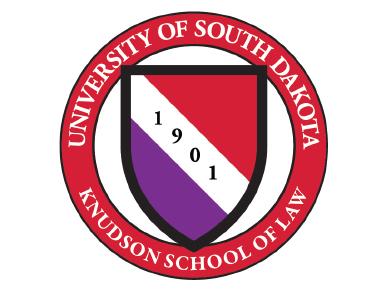
MembersoftheStateBarofSouthDakota,
MarshallM.McKusick,whoservedthelegalprofessionandtheUniversityofSouthDakota KnudsonSchoolofLawfornearlysixdecades,trulymadealastingimpact.Theresourceshe hasprovidedhavebeenofgreatbenefitandvaluetolawstudents,pastandpresent,andwill continuetohaveapositiveimpactonthoseenteringintothelegalprofessionforgenerationsto come.
Eachyear,inhonorandcelebrationofMarshallMcKusick’sdedicationandservicetothelegal communityinSouthDakota,theStudentBarAssociationrecognizesanoutstandingmemberof theSouthDakotaBarfortheircontributiontothelegalprofessionandtheUniversityofSouth DakotaKnudsonSchoolofLaw.
The2025McKusickAwardnominationsarenowopen.Pleaseconsidersubmittinga nomination.TheawardwillbepresentedattheStateBarConventionthisJune.
Nominationscanbesubmittedviae-mailtoBrock.Brown@coyotes.usd.edu,oraddressedto BrockBrownc/oStudentBarAssociation,UniversityofSouthDakotaKnudsonSchoolof Law,414EastClarkStreet,Vermillion,SouthDakota57069.
WelookforwardtoreceivingyournominationspriortotheduedateofMarch1,2025.
Sincerely,
BrockA.Brown SBAPresident2024-25 USDKnudsonSchoolofLaw
BrockBrown President GarrettAdams VicePresident KelseyMilford Secretary IsabelleKremeier Treasurer TiaVlasman ABARep. EricGednalske SGARep.
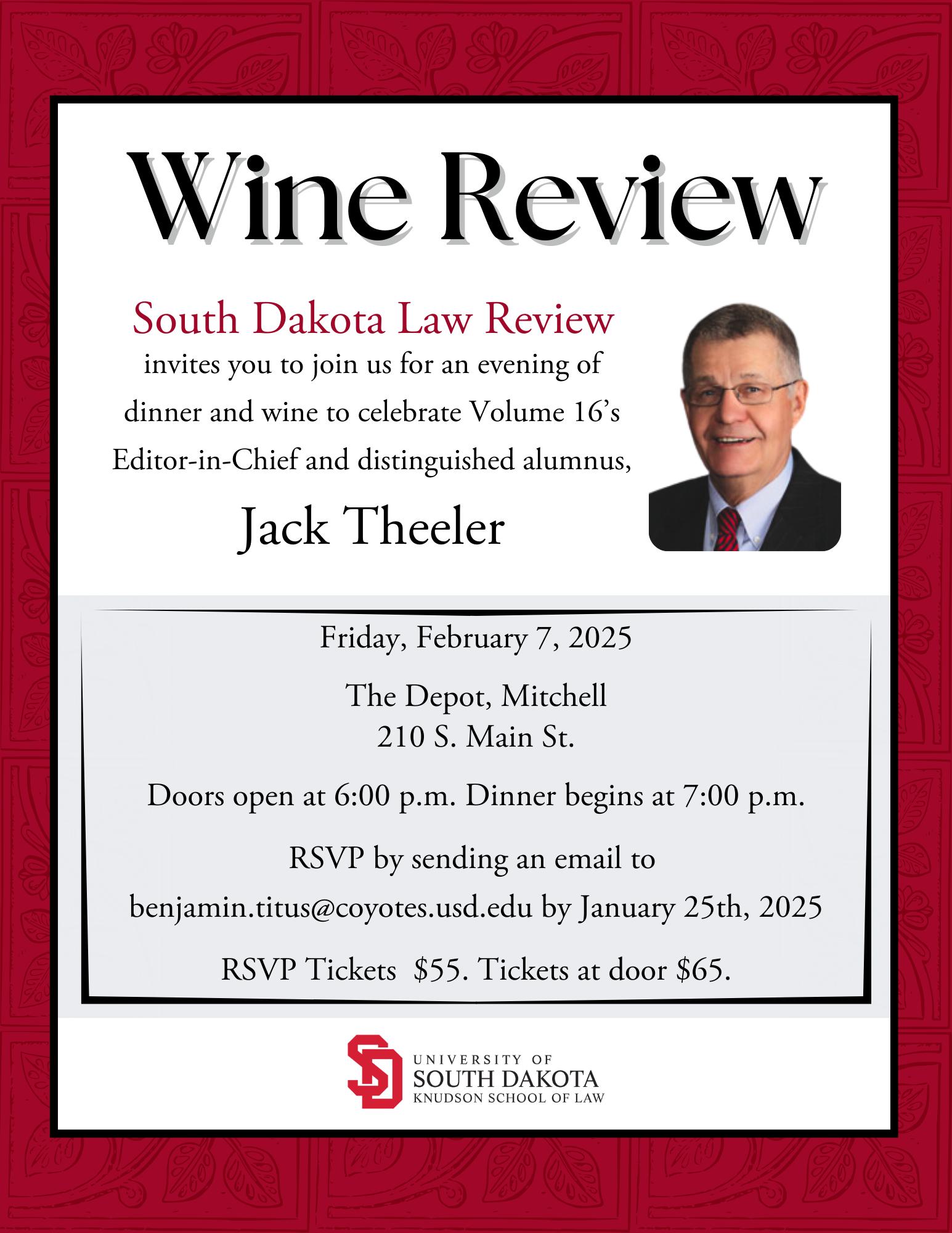
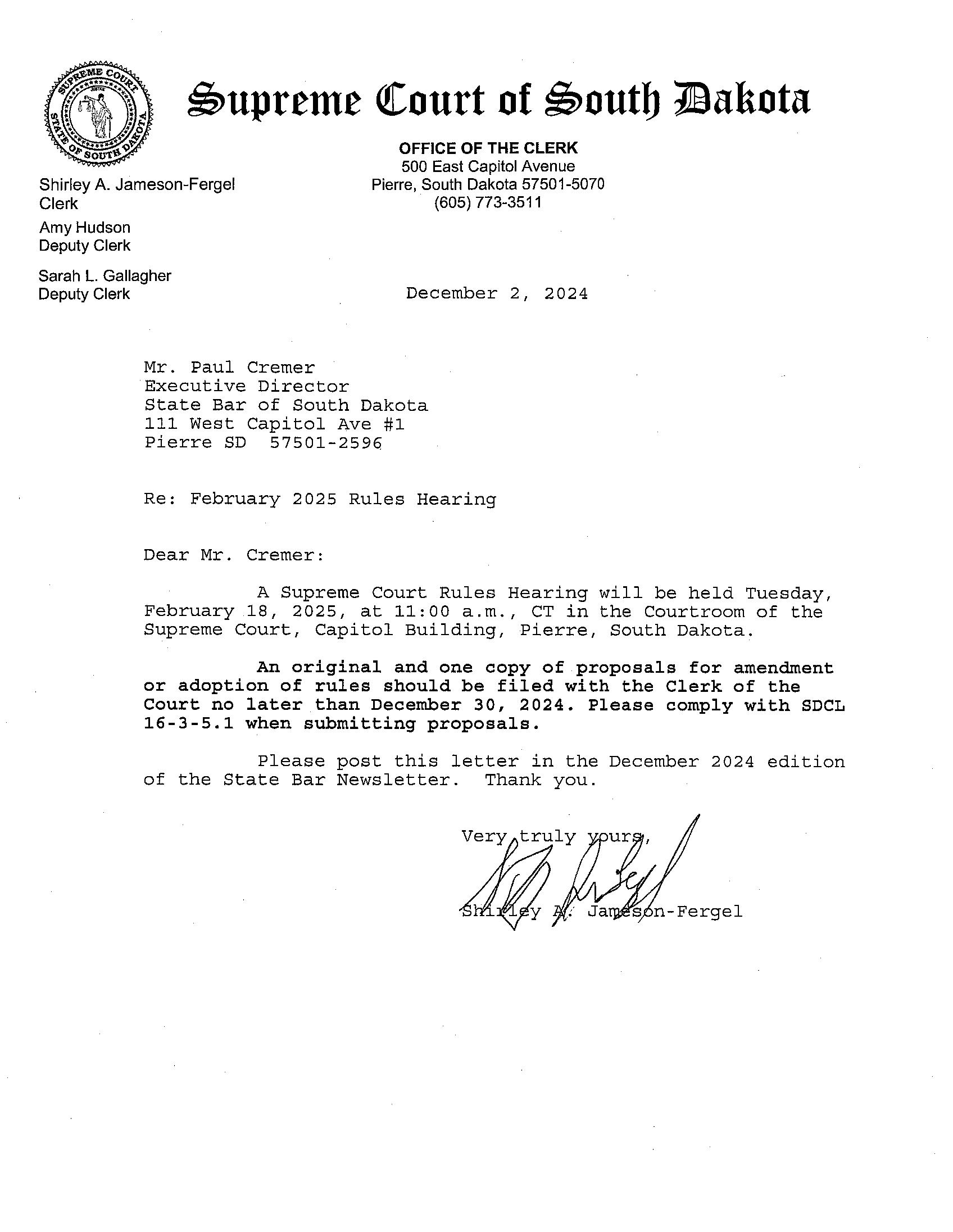

PLEASE JOIN US FOR BANKRUPTCY ROUNDTABLE DISCUSSIONS
Clair R. Gerry, Gerry Law Firm, Prof. LLC
Robert L. Meadors, Brende & Meadors, LLP
Thomas A. Blake, Thomas Blake Law Office
Anthony M. Hohn, Davenport, Evans, Hurwitz & Smith, LLP
Jordan J. Feist, Woods, Fuller, Shultz & Smith P.C.
Each speaker will host five brief rotations of small groups for seven minutes to discuss entry-level intricacies of bankruptcy practice. A formal itinerary will follow.
FRIDAY, MARCH 21, 2025
3:30-4:30 P.M.
UNITED STATES COURTHOUSE
GRAND JURY ROOM
400 S. PHILLIPS AVENUE
SIOUX FALLS, SD
IF YOU ARE A PERSON WITH A DISABILITY AND REQUIRE SPECIAL ACCOMMODATION TO PARTICIPATE, PLEASE CONTACT THE BANKRUPTCY CLERK’S OFFICE AT: 605-357-2400.

• The Public Sector Attorney of the Year Award recognizes the public servants of the State Bar of South Dakota who have had a distinct impact on the law, governmental entities, or the legal profession in South Dakota in the past year.
• An individual must be a member in good standing of the State Bar of South Dakota. NOMINATIONS
• Nominations and any supporting materials (i.e., letters) should be submitted to Public Sector President John Richter (John.Richter@state.sd.us) no later than April 25, 2025. At a minimum, each nomination should include a brief synopsis of the impact made by the nominee on the law, governmental entities, or the legal profession in South Dakota during the past year. The criteria for this award are intentionally broad. The attorney's credentials aren't the focus here; we're most interested in what they did in the past year to leave a mark. Materials received on behalf of a nominee will be reviewed by a subcommittee of the Public Sector Section, and an award recipient will be chosen.
• The award recipient will be announced at the June 2025 Bar Convention and State Bar Newsletter.
A very Special to Boyce Law Firm, LLP , & May Adam Gerdes & Thompson, LLP , for sponsoring Coffee and Donuts with the Legislature.

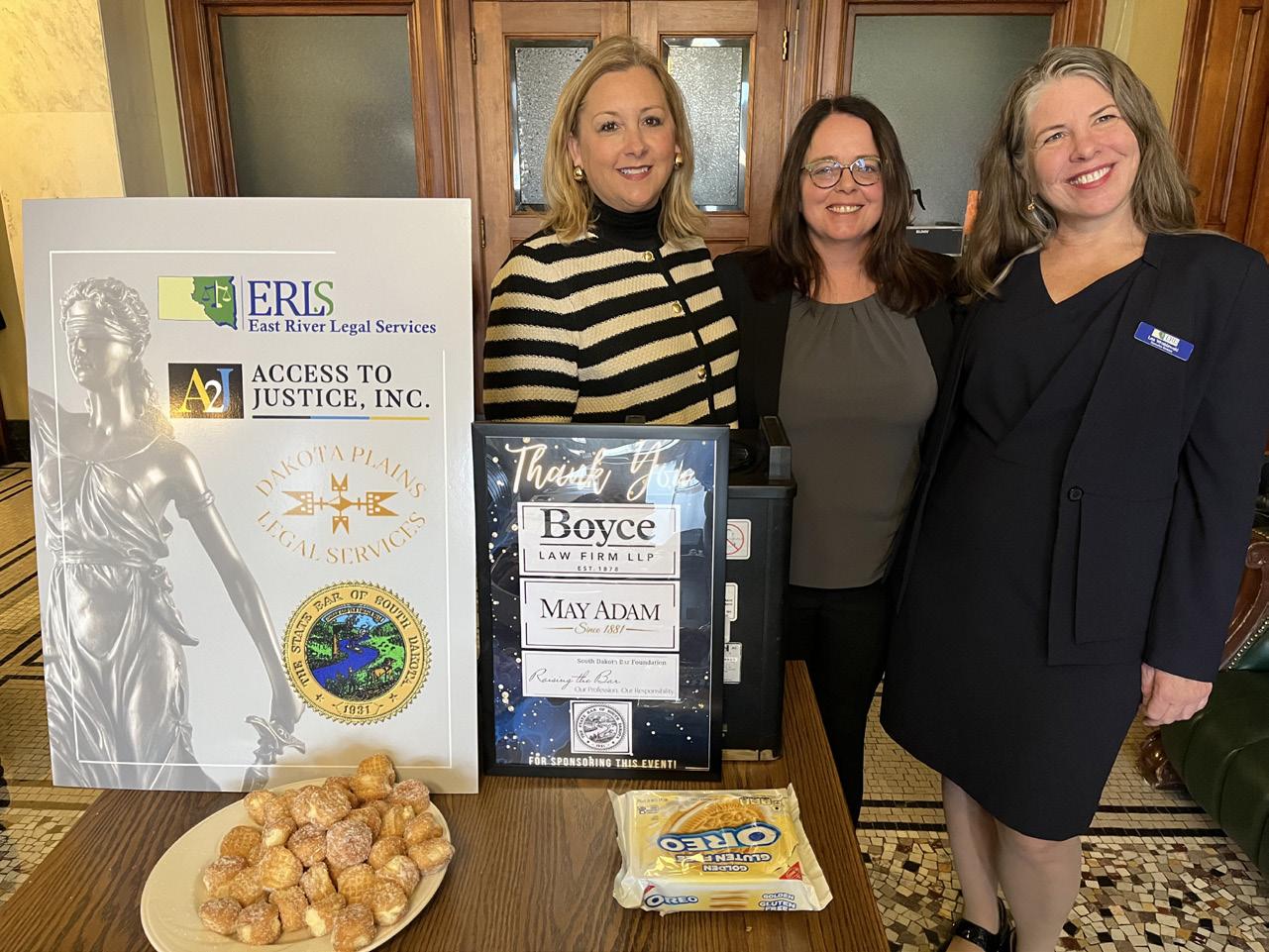



Published with permission of Tom Fritz. Please see Don Shultz obituary on page 38 of the January 2025 State








The current appointment of Magistrate Judge Cullen McNeece is due to expire on June 21, 2025. Magistrate Judge Cullen McNeece serves in the Fifth Judicial Circuit.
The duties of a magistrate judge include conducting preliminary hearings in all criminal cases, acting as committing magistrate for all purposes and conducting misdemeanor trials. Magistrate judges may also perform marriages, receive depositions, decide temporary protection orders and hear civil cases within their jurisdictional limit.
Pursuant to UJS policy members of the bar and the public are invited to comment as to whether Magistrate Judge Cullen McNeece should be reappointed to another four-year term. Written comments should be directed to:
Chief Justice Steven R. Jensen
Supreme Court
500 East Capitol Pierre, SD 57501
Comments must be received by March 18, 2025.
The current appointment of Magistrate Judge Chad Callahan is due to expire on July 9, 2025. Magistrate Judge Callahan serves in the Fourth Judicial Circuit.
The duties of a magistrate judge include conducting preliminary hearings in all criminal cases, acting as committing magistrate for all purposes and conducting misdemeanor trials. Magistrate judges may also perform marriages, receive depositions, decide temporary protection orders and hear civil cases within their jurisdictional limit.
Pursuant to UJS policy members of the bar and the public are invited to comment as to whether Magistrate Judge Chad Callahan should be reappointed to another four-year term. Written comments should be directed to:
Chief Justice Steven R. Jensen
Supreme Court
500 East Capitol Pierre, SD 57501
Comments must be received by April 10, 2025.

The following agents or agencies that are authorized to sell the State Bar Association Health Plan.
Office Location
Mitchell & Yankton Area
Aberdeen Area
Sioux Falls Area
Sioux Falls & Brookings Area
Pierre, Mitchell & Sioux Falls Area
Watertown Area
Dice Financial
Mark Mehlhoff
Midwest Employee Benefits
McGreevy & Associates
Fisher Rounds & Associates
Freimark & Associates
Office Location Agency Agency Contact Contact
West River
Black Hills Insurance Agency
Black Hills Insurance Agency
Carver Insurance
Jacquelyn Johnson
Mark Mehlhoff
Dawn Knutson
John Lawler
Josh Gilkerson
Todd Freimark
Dan Maguire
Everett Strong
Lisa Knutson
Questions on Eligibility, Rates, and Services?
Please contact the agency listed above based on your office location within the state for questions related to the Association Healthcare Plan.
Your Assistance Program can help you reduce stress, improve mental health, and make life easier by connecting you to the right information, resources, and referrals.
All services are free, confidential, and available to you and your family members. This includes access to short-term counseling and the wide range of services listed below:
Mental Health Sessions
Manage stress, anxiety, and depression, resolve conflict, improve relationships, and address any personal issues. Choose from in-person sessions, video counseling, or telephonic counseling.
Life Coaching
Reach personal and professional goals, manage life transitions, overcome obstacles, strengthen relationships, and achieve greater balance.
Financial Consultation
Build financial wellness related to budgeting, buying a home, paying off debt, resolving general tax questions, preventing identity theft, and saving for retirement or tuition.
Legal Referrals
Receive referrals for personal legal matters including estate planning, wills, real estate, bankruptcy, divorce, custody, and more.
Work-Life Resources and Referrals
Obtain information and referrals when seeking childcare, adoption, special needs support, eldercare, housing, transportation, education, and pet care.
Personal Assistant
Save time with referrals for travel and entertainment, seeking professional services, cleaning services, home food delivery, and managing everyday tasks.
Medical Advocacy
Get help navigating insurance, obtaining doctor referrals, securing medical equipment, and planning for transitional care and discharge.
Member Portal
Access your benefits 24/7/365 through your member portal with online requests and chat options. Explore thousands of self-help tools and resources including articles, assessments, podcasts, and resource locators.



Your Assistance Program offers a wide range of benefits to help improve mental health, reduce stress and make life easier all easily accessible through your member portal.
a
Request counseling by submitting an online form or live chat. Choose from in-person or virtual counseling options to meet your needs.
Request Referrals & Resources
Submit a request for family care and lifestyle support including childcare and eldercare referrals, legal referrals and financial consultation, personal assistant referrals and medical advocacy consultation.
Explore Thousands of Self-Care Articles & Resources
Health and lifestyle assessments, interactive checklists, soft skills courses, podcasts, resource locators, exclusive discounts, and expansive articles on whole health and well-being.
Visit Your Online Financial Center
Featuring worksheets, calculators, and a wide range of financial resources and tools to help reach personal goals and build financial wellness.

Visit www.sandcreekeap.com and click on “Sign Up” below the login form
To create an account and sign in, enter your email address and company code: sdhelp
www.sandcreekeap.com Code: sdhelp


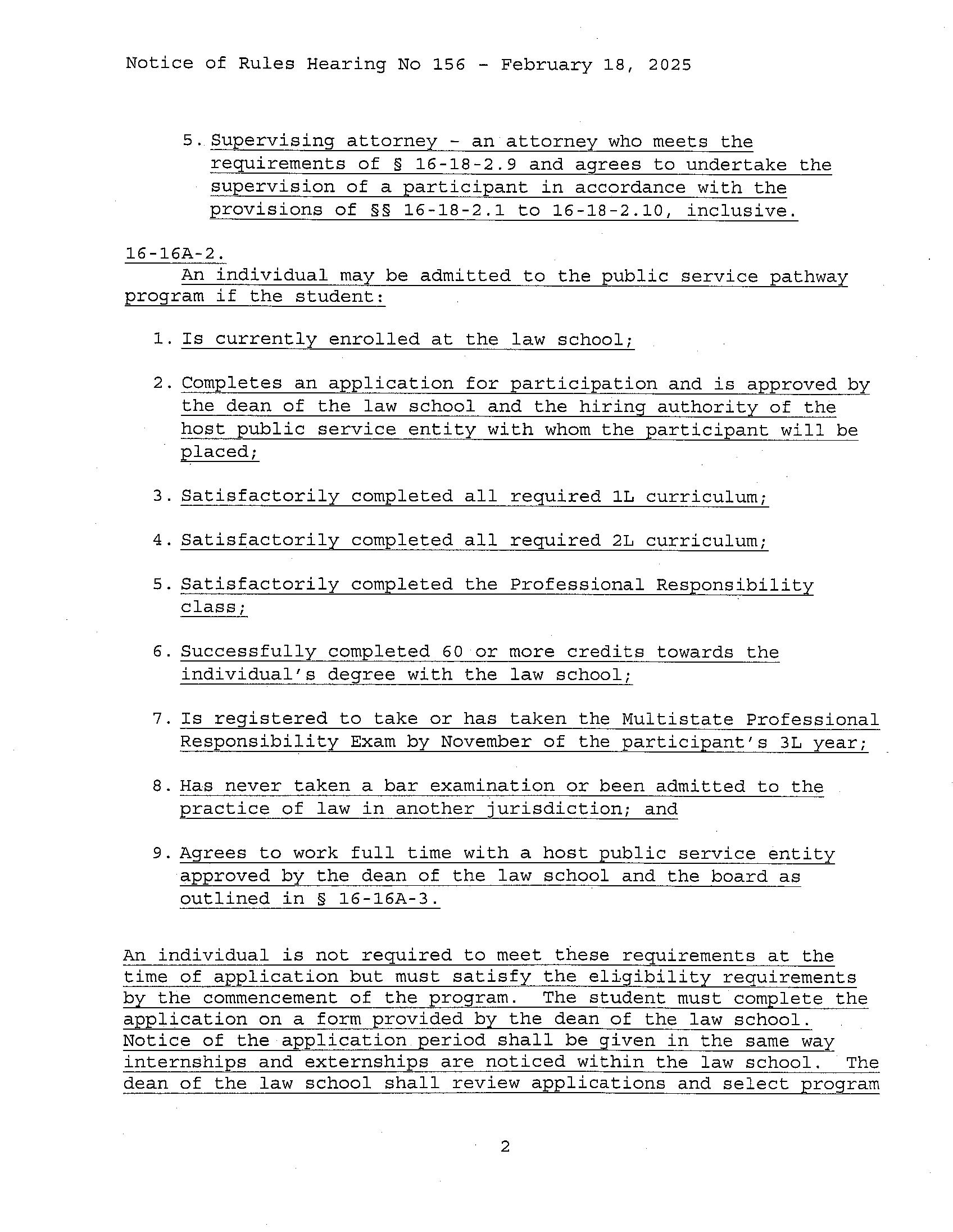
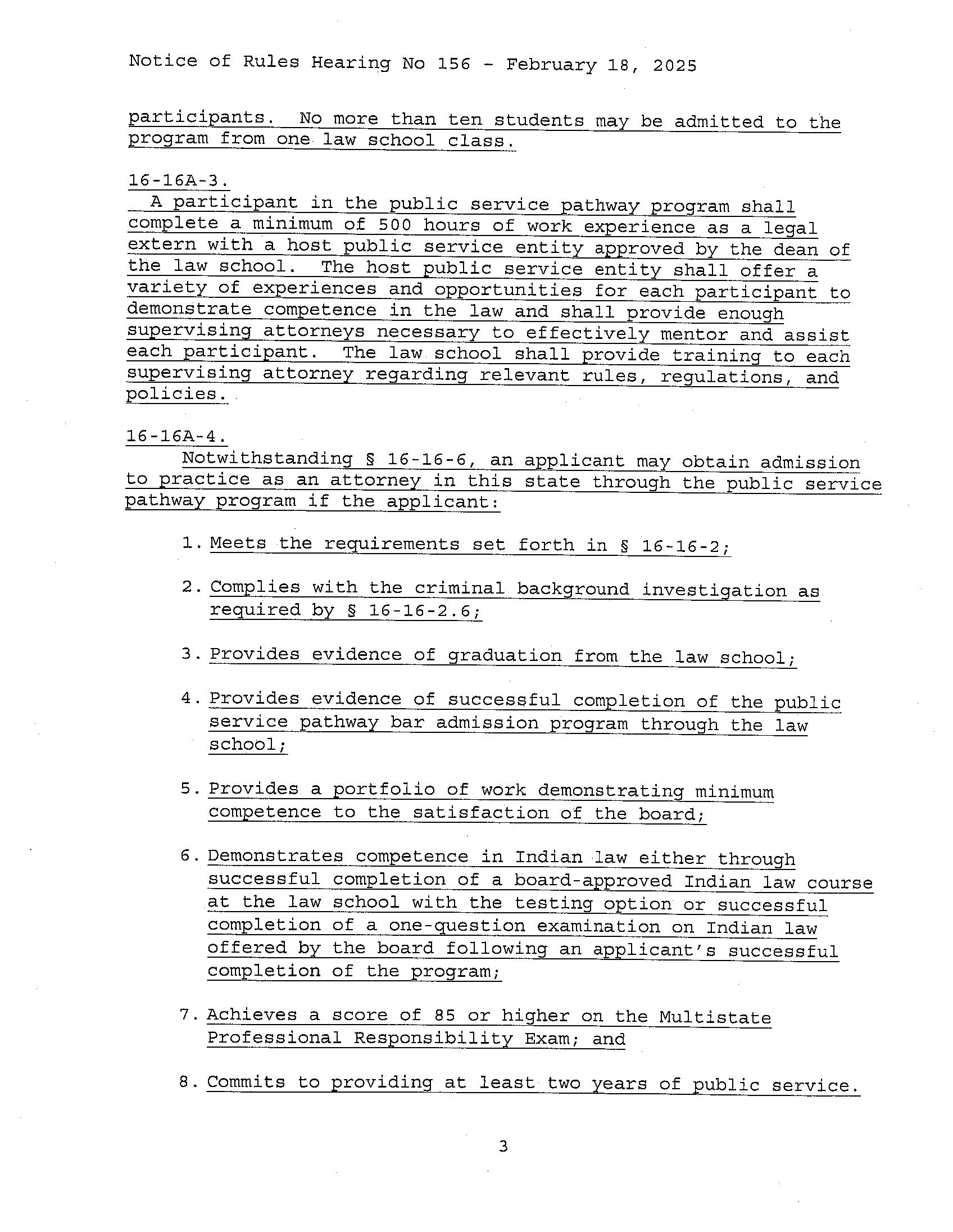
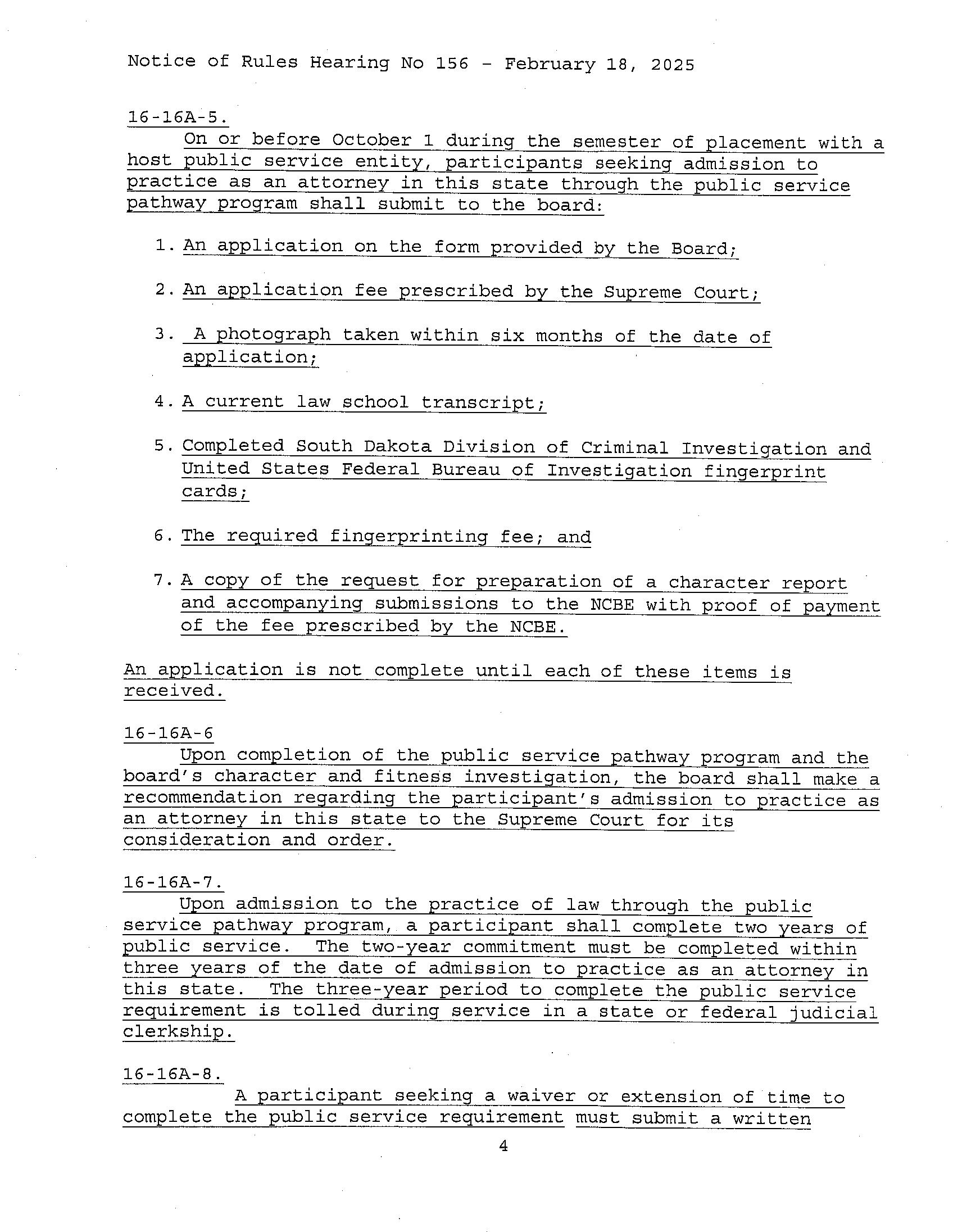

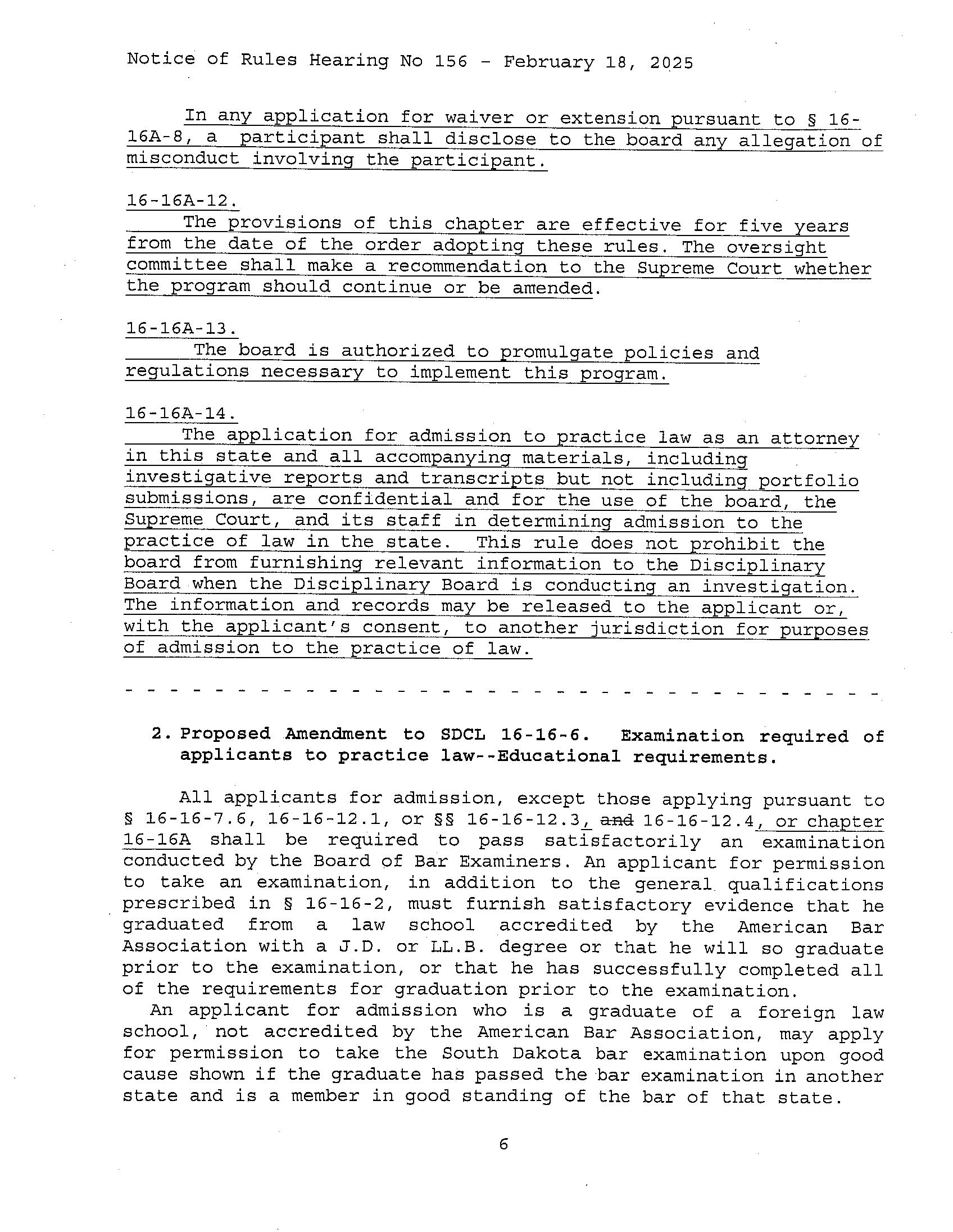

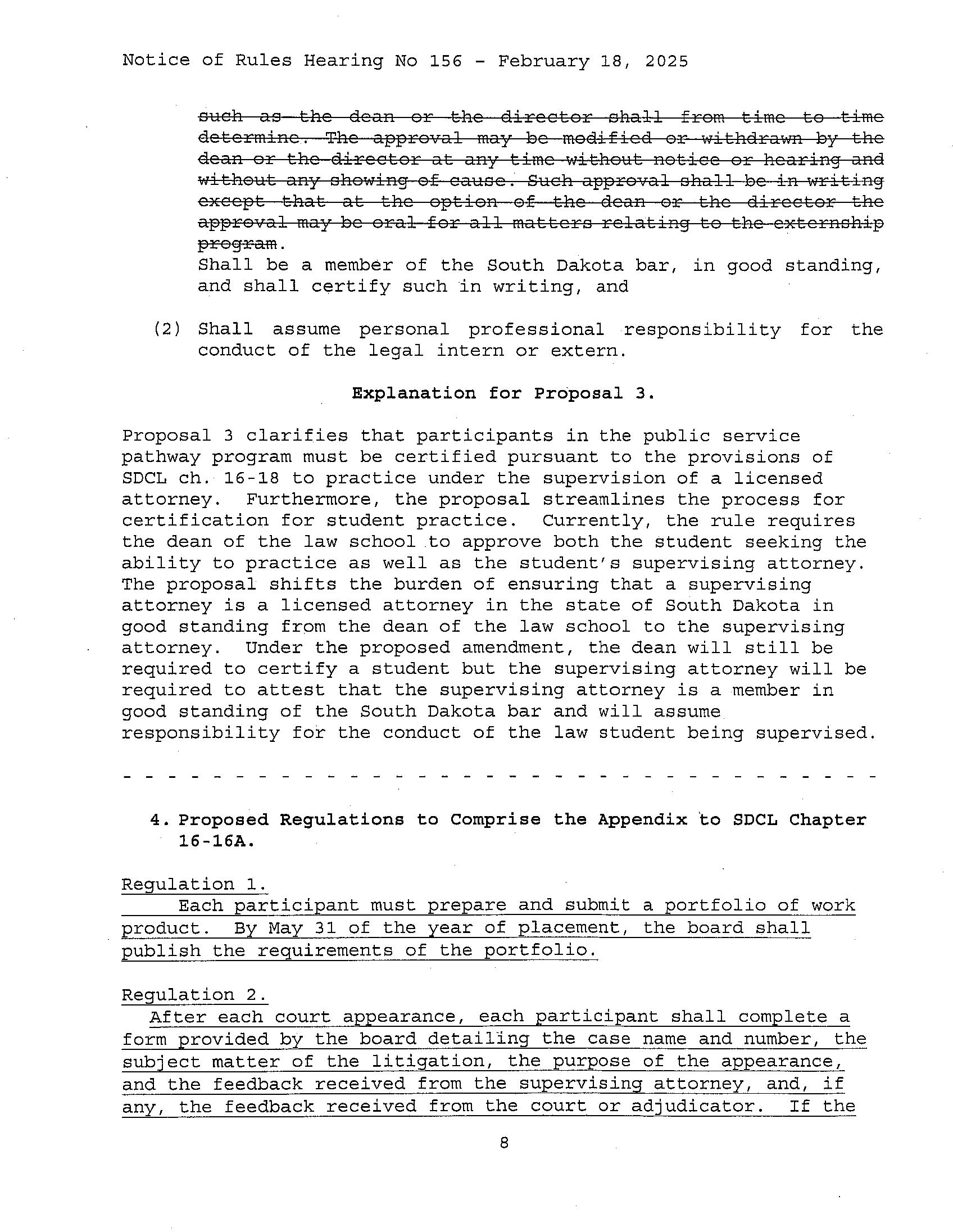


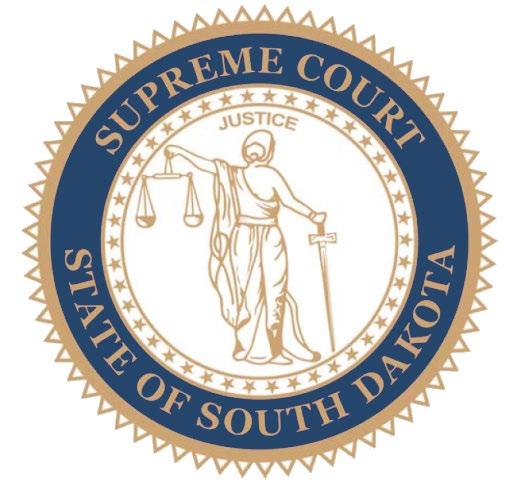
December 2024
In 2023, the South Dakota Supreme Court appointed a steering committee to examine the needs of legal providers, including the bar admissions process. In its final report issued in December of 2023, the Steering Committee recommended a streamlined pathway to bar admission for public interest. The Steering Committee suggested a program be developed in collaboration with the University of South Dakota Knudson School of Law (hereinafter “Law School”) during which law students would engage in a supervised practice during law school which would be evaluated by the South Dakota Board of Bar Examiners (hereinafter “Board”) to determine minimum competence. These participants would then be admitted to the bar without examination with a two or three-year commitment to public service.
The Implementation Committee was subsequently appointed in January of 2024 by the South Dakota Supreme Court to propose a plan to implement a public service pathway to admission. The Committee is comprised of a variety of stakeholders including members of the judiciary, long-time members of the bar, new attorneys, a member of the Board, and individuals currently engaged in the public service sector. Committee members were:
• Justice Scott Myren, South Dakota Supreme Court
• Hon. Jane Wipf Pfeifle, Retired Circuit Judge, Seventh Circuit
• Neil Fulton, Dean, University of South Dakota Knudson School of Law
• J. Crissman Palmer, Gunderson, Palmer, Nelson & Ashmore, LLP
• Daniel K. Haggar, Minnehaha County State’s Attorney
• Eric D. Whitcher, Director, Pennington County Public Defender’s Office
• Josey Blare, Lynn, Jackson, Shultz & Lebrun, P.C.
• Rachelle M. Norberg, Gunvordahl, Gunvordahl, & Norberg Prof. L.L.C.
• John T. Richter, General Counsel, South Dakota Retirement System
• Ann F. Mines Bailey, Chief of Bar Exam/Secretary, Board of Bar Examiners
The Committee met seven times throughout the course of 2024. (Meeting minutes are attached hereto as Appendix A.) In drafting the proposed program, the Committee focused on how best to determine minimum competence and provide public service. The following will provide the Committee’s proposed plan and its
analysis of the most essential topics in designing the Public Service Pathway Program.
Like the Steering Committee, the Implementation Committee proposes the authorization of a five-year pilot program for a public service pathway to bar admission. The purpose of the Program is to provide alternative admission to the bar while encouraging public service practice. The Program will be comprised of an extensive law school program to assess academic achievement and its practical application; a review of the competence of the participants by the Board; and a character and fitness review of each participant by the Board. Upon completion of the Law School Program, satisfactory reviews by the Board, and a finding by the Board that the participant meets the character and fitness requirements, an applicant will be granted admission. This admission carries a requirement that the participant completes two or three years of public service.
Students enrolled at the Law School may apply to participate in the Public Service Pathway Program if the student:
1. Is currently enrolled at the Law School;
2. Completes an application for participation and is approved by the dean of the Law School and the hiring authority of the entity with which they will be placed;
3. Has satisfactorily completed all required 1L curriculum, all required 2L curriculum, and the Professional Responsibility class;
4. Has successfully completed 60 or more credits towards their degree with the Law School;
5. Has taken, or is registered to take, the Multistate Professional Responsibility Examination (MPRE) by November of 3L year; and
6. Agrees to work full time with a host public service entity approved by the dean of the Law School and the Board.
Not more than ten students may be admitted from one law school class. The application form will be determined by the dean. Notice of the application period will be given in the same manner that the dean notices internships/externships. The dean will be responsible for reviewing the applications and selecting the participants. It is anticipated that, at least initially, the dean will be recruiting applicants.
The Program will be offered the fall semester of the participant’s third year of law school and will require a minimum of 500 hours of work experience. Participants may, with the approval of the dean, be allowed to take outside classes of up to three credit hours.
Upon entry into the Program, the Law School shall place the participant in an externship with a public service entity which has been approved by the Law School. The placement entity shall provide sufficient supervising attorneys who will mentor and assist the participants in obtaining a variety of experiences which will satisfy the requirements of the Program as determined by the dean of the Law School, as well as the requirements set forth by the Board. The Law School, in collaboration with the Board, will provide training to the supervising attorneys to apprise them of the requirements and expectations.
During the placement, participants will develop a portfolio of written and oral work which will be reviewed by the Board. The portfolio will be comprised of documents and oral or video submissions as determined by the Board. The Board shall make the requirements of the portfolio public and shall provide written notice of those requirements to the dean of the Law School no later than two months before the commencement of the fall semester.
A participant may obtain admission to the South Dakota bar through the Public Service Pathway Program if the participant:
1. Meets the requirements set forth in SDCL 16-16-2;
2. Complies with the criminal background investigation as required by SDCL 1616-2.6;
3. Achieves a score of 85 or higher on the Multistate Professional Responsibility Exam;
4. Provides evidence of successful completion of the Public Service Pathway Program through the Law School and graduation from the Law School;
5. Provides a portfolio of work demonstrating minimum competence to the satisfaction of the Board; and
6. Demonstrates competence in Indian law either through completion of an approved Indian Law course completed at the Law School (with the testing option) or passage of a one-question examination on Indian law which the
Board will offer following completion of the Law School Public Service Pathway Program.
Like all applicants for admission to the bar, participants must apply for admission. To afford sufficient time for the character and fitness report to be generated and to place the Board on notice as of the need to review an individual’s work product, it is recommended that the deadline for application for these participants be on or before October 1 of the semester of their placement.
The application should include:
1. A South Dakota bar application;
2. The fee prescribed by the Court;
3. A recent photograph (taken within six months of the date of application);
4. A law school transcript;
5. Completed DCI and FBI fingerprint cards; and
6. The required fingerprinting fee.
Each participant will also submit by October 1 during the semester of placement, a request for preparation of a character report and accompanying application to the National Conference of Bar Examiners (NCBE) with the accompanying fee prescribed by the NCBE.
Upon admission to the practice of law through this Public Service Pathway Program, participants shall complete two or three years of public service within South Dakota. This commitment must be completed within three years of the date of admission to the bar if a two-year commitment is required or within four years if a three-year commitment is required. If a participant chooses to serve a state or federal clerkship, the time for completing the public service commitment will be tolled and not begin to run until completion of the clerkship. Failure to complete the commitment within the allotted time, except when a waiver or extension has issued, may result in the revocation of the participant’s license by the Court.
A participant may seek a waiver of a portion of the public service requirement, or an extension of time to complete the requirement. The waiver or extension may be requested by filing a petition with the secretary of the Board as soon as practicable. To qualify for a waiver or extension, the participant must demonstrate extraordinary circumstances, personal hardship, or that the public service employment is terminated for reasons beyond the control of the participant and the participant is
unable to secure new employment in public service. The Board is empowered to make inquiries and investigate the appropriateness of issuing a waiver. The Board may take and hear testimony and compel, by subpoena, the attendance of witnesses and the production of books, papers, and documents. Any member of the Board may administer oaths and issue subpoenas. Upon conclusion of its investigation, if any, the Board shall issue a recommendation to the Court for its consideration and order. Additionally, while failure to complete the public service requirement alone is not a violation of the Rules of Professional Responsibility, the Board is authorized to make referrals to the Disciplinary Board of the South Dakota Bar when appropriate.
Participants who have received their license through this Program shall report to the secretary of the Board their place of employment until such time as they have satisfied the two-year commitment. At the conclusion of the commitment, the participant shall file with the secretary of the Board an affidavit upon a form provided by the secretary of the Board, and approved by the Board, attesting to the completion of the public service commitment.
If the Board becomes aware of a participant who has not completed the public service commitment, or will not be able to complete the requirement within the deadline, the Board may inquire or investigate and make recommendations to the Court.
Finally, the Committee recommends the formation of an oversight committee. The oversight committee should be comprised of three individuals appointed by the Court—one individual from the Law School, one from the Board, and one from the Court. The purpose of the oversight committee would be to monitor the Program, propose changes to the process, and to make a final recommendation at the conclusion of the five-year pilot.
In reviewing the issue of minimum competence, the Committee looked at the current methods of assessment, the most recent and extensive studies regarding the assessment of minimum competence, and the requirements set forth by the South Dakota Supreme Court.
Currently, South Dakota requires that all attorneys1 take and pass what is commonly referred to as “the bar examination2.” The bar examination is comprised of the Multistate Performance Test (MPT), the Multistate Essay Exam (MEE), and the Multistate Bar Examination (MBE).
The MPT is comprised of two questions for which examinees are provided a “file” (documents providing the facts of the case) and a “library” (documents providing the specific law such as cases or statutes). Examinees are given 90 minutes for each question. During those 90 minutes, examinees are required to review the file and library and answer the pertinent questions thus demonstrating the ability to identify legal principles and apply those principles to the facts at hand.
The MEE is a three-hour exam comprised of six essay questions which provide a fact pattern and require the examinee to provide analysis based upon the law which they have previously studied. In South Dakota, one of the six questions is an Indian law question which is drafted by one of the sitting members of the Board. The remaining five questions will involve one of the following areas: business associations (agency and partnership; corporations and limited liability companies), civil procedure, conflict of laws, constitutional law, contracts (including Article 2 [sales] of the Uniform Commercial Code), criminal law and procedure, evidence, family law, real property, torts, trusts and estates (decedents’ estates; trusts and future interests), and Article 9 (secured transactions) of the Uniform Commercial Code. A question may include issues involving more than one area of law.
The MBE is comprised of 200 multiple choice questions administered over two, three-hour testing periods. The MBE covers the following legal topics: civil procedure, constitutional law, contracts, criminal law and procedure, evidence, real property, and torts.
Thus, upon successful completion of the bar examination, an examinee will have been tested on:
• Civil Procedure
• Constitutional Law
• Contracts
• Criminal Law and Procedure
• Evidence
• Real Property
• Torts
and may have been tested on:
• Business Associations
• Conflict of Laws
• Family Law
• Trusts and Estates
• Secured Transactions
This version of the bar examination, however, is currently undergoing a major overhaul. Beginning in July of 2026, NCBE will be offering the NextGen bar examination, and the current version will be phased out with its final test date February of 2028.
The NextGen bar exam will test the following foundational concepts and principles: business associations, civil procedure, constitutional law, contract law, criminal law, evidence, real property, torts, family law3, trust and wills4, legal research, legal writing, issue spotting and analysis, investigation and evaluation, client counseling and advising, negotiation and dispute resolution, client relationship and management.
The catalyst for the NCBE’s change in the format and testing areas of the bar examination was its own task force which reviewed the current assessment and made recommendations that the bar examination “should test fewer subjects and should test less broadly and deeply within the subjects covered, that greater emphasis should be placed on assessment of lawyering skills to better reflect realworld practices [.]”5 Thus, there is a fundamental shift from the focus on areas of knowledge to using those foundational areas of knowledge to test foundational skills.
The Institute for the Advancement of the American Legal System (IAALS) also conducted a study to develop a definition of minimum competence and to review methods of assessment. The IAALS came up with twelve building blocks of competence and made ten recommendations6 regarding assessment. The essence of the study is that jurisdictions need to focus on more than rote memorization of topics and should be looking at practical skills that attorney’s use daily.
In addition to these two studies, the Committee looked to SDCL 16-16-1.17 and SDCL 16-16-108 for guidance in determining what should be assessed during a minimum competence assessment. The Committee then examined how the Public Service Pathway Program would compare to the benchmarks set by the NCBE report, the IAALS study, and SDCL 16-16-1.1. The following charts best demonstrate that comparison.
*Indicates that the subject may be tested but is not required to be tested.
*Business Associations X
*Conflict of Laws
*Family Law
Tested in performance tasks for 2026-2028.
Tested with foundational concepts beginning in July 2028.
*Trusts and Estates In performance tasks in 2026-2028
*Secured Transactions
Participants may have to demonstrate knowledge during Pathway Program.
Torts X Coursework
Participants may have to demonstrate knowledge during Pathway Program.
Real Property X Coursework
Participants may have to demonstrate knowledge during Pathway Program.
Evidence X Coursework
Minimum 500 hours in Pathway Program
Criminal Law and Procedure X Coursework
Minimum 500 hours in Pathway Program
Contracts X Coursework
Participants may have to demonstrate knowledge during Pathway Program.
Constitutional Law X Coursework
Minimum 500 hours in Pathway Program Civil Procedure X Coursework
Participants may have to demonstrate knowledge during Pathway Program.
No corresponding requirement
NCBE’s Areas of Competence (NextGen)
Legal Research
One Question Exam or Approved Indian Law course at Law School
Participants may have to demonstrate knowledge during Pathway Program.
Indian Law (SDCL 16-16 -10 and Regulation 3)
IAALS Building Blocks Provisions
SDCL 16-16-1.1 How Demonstrated by Pathway Program?
Legal Writing
2. Understanding of legal processes and sources of law
3. Understanding of threshold concepts in many subjects
6. Ability to identify legal issues
7. Ability to conduct research
9. Ability to see the “big picture” of client matters
12. Ability to pursue selfdirected learning
2. Understanding of legal processes and sources of law
4. Ability to interpret legal materials
6. Ability to identify legal issues
7. Ability to conduct research
8. Ability to communicate as a lawyer
9. Ability to see the “big picture” of client matters
SDCL 16-161.1(2), (3), (4), and (8).
• Coursework
• Minimum 500 hours in Pathway Program
• Portfolio documents including pleadings, motions, findings of fact
SDCL 16-161.1(2), (3), (8), and (10).
• Coursework – Law School requires a writing course each year.
• Minimum 500 hours in Pathway Program
• Portfolio documents
• Potentially sitting for the Indian law question in lieu of the Indian Law class
Issue Spotting and Analysis
2. Understanding of legal processes and sources of law
4. Ability to interpret legal materials
6. Ability to identify legal issues
7. Ability to conduct research
9. Ability to see the “big picture” of client matters
12. Ability to pursue selfdirected learning
Investigation and Evaluation 5. Ability to interact effectively with clients
6. Ability to identify legal issues
7. Ability to conduct research
9. Ability to see the “big picture” of client matters
12. Ability to pursue selfdirected learning
Client Counseling and Advising
Negotiation and Dispute Resolution
5. Ability to interact effectively with clients
7. Ability to conduct research
8. Ability to communicate as a lawyer
1. Ability to act professionally and in accordance with the rules of professional conduct
7. Ability to conduct research
8. Ability to communicate as a lawyer
SDCL 16-161.1(2), (4), (8), (9), and (10).
• Coursework – Law School requires a writing course each year.
• Minimum 500 hours in Pathway Program
• Portfolio documents
• Potentially sitting for the Indian law question in lieu of the Indian Law class.
Client Relationship and Management
No corresponding requirement
5. Ability to interact effectively with clients
8. Ability to communicate as a lawyer
1. Ability to act professionally and in accordance with the rules of professional conduct
SDCL 16-161.1(2), (3), (4), (7), (8), (9), and (10).
• Coursework – Law School requires a writing course each year.
• Minimum 500 hours in Pathway Program
• Portfolio documents
• Potentially sitting for the Indian law question in lieu of the Indian Law class.
SDCL 16-16-1.1(1) through (10).
• Minimum 500 hours in Pathway Program
• Portfolio documents
SDCL 16-16-1.1(1) through (10).
• Minimum 500 hours in Pathway Program
• Portfolio documents
SDCL 16-16-1.1 (1), (3), (6), (7), (8), (9), and (10).
SDCL 16-16-1.1(1) through (10).
• Minimum 500 hours in Pathway Program
• Portfolio documents
• Coursework
• Exam – a score of 85 or higher on the Multistate Professional Responsibility Exam
• Minimum 500 hours within the Pathway Program
No corresponding requirement
No corresponding requirement
10. Ability to manage a lawrelated workload responsibly
11. Ability to cope with the stresses of legal practice
SDCL 16-161.1(3), (4), (7), (8), (9), and (10).
SDCL 16-16-1.1(1) through (10)
• Character and Fitness Review
• Minimum 500 hours in the Pathway Program
• Submission of the portfolio
• Minimum 500 hours in the Pathway Program
• Submission of the portfolio
• Character and Fitness Review
• Based upon these comparisons, as set forth in the charts above, the Public Service Pathway Program will assess many of the areas of foundational knowledge that are routinely tested in the current iteration of the bar examination and the NextGen exam.
• The Public Service Pathway Program will assess all the foundational skills that have been found to be essential in the practice of law.
• Finally, the Public Service Pathway Program will satisfy the requirements of SDCL 16-16-1.1 and 16-16-10.
• The Committee is confident that the Public Service Pathway Program will provide a holistic assessment of the minimum competence of the participants.
South Dakota requires that its attorneys demonstrate competence in Indian law.10 The Committee has reviewed this requirement and recommends that it also be applied to applicants admitted through the Public Service Pathway Program. The Committee further recommends that applicants seeking admission through the Public Service Pathway Program may satisfy this requirement by either successfully passing a one-question Indian law exam offered by the Board or by successfully completing the Indian Law course with the testing option offered by the Law School.
Both the Steering Committee and this Committee received public comment regarding this issue. The Committee took all comments into consideration in making this recommendation. While the comments suggested that the Indian law requirement should not be satisfied by taking an Indian Law class, the Committee finds that some flexibility is necessary in this alternative pathway program. The
most important purpose of the Indian law requirement is to ensure that the attorneys practicing in this state are able to recognize potential Indian law issues and act accordingly. This assurance can be achieved through the completion of a well-rounded Indian Law class which comports with the definition of “Indian Law” as set forth in Regulation 3. See SDCL Ch. 16-16, § 3. “Indian Law”, as defined by the Board, includes the “basic principles of federal Indian law, including but not limited to civil and criminal jurisdiction, the Indian Civil Rights Act, the Indian Child Welfare Act, and the Indian Gaming Regulatory Act.” Referring to this definition should alleviate some of the concerns that the requirement could be satisfied by taking a class focusing on the law of only one particular Tribe or a class that focused only on jurisdiction.
Additionally, the Committee understands that the Indian Law course as currently offered at the Law School may be taken with a writing option or a testing option. Thus, to ensure that the applicant has a wide range of knowledge, the Committee recommends that the Indian law requirement can only be satisfied by the Indian Law course with the testing option.
The Committee recommends that applicants seeking admission though the Public Service Pathway Program undergo the same rigorous character and fitness review utilized for applicants who are admitted by examination or those admitted without examination because of years of lawful practice in another jurisdiction. Accordingly, the Committee recommends that these applicants complete all the same character and fitness application requirements, including fingerprinting, completion of a character and fitness report request, and submission of all the applicable fees.
In its report, the Steering Committee suggested the admission through this Program be conditioned on a two or three-year public service commitment. Discussion was held as to whether two years was a sufficient commitment to recoup the time and resources expended by the Law School, the Board, and the Court in the implementation of this Program. Several of the Committee members who currently engage in public service practice noted that, in their experience, an individual generally knows if he/she is suited to public service within eighteen months of practice. Moreover, it takes approximately one year for a new attorney to confidently practice. As a result, the Committee does not recommend less than two years.
The Committee also considered whether the public service commitment should be longer than two years. The Committee is split on whether the public service commitment should be two years or three years. A lengthier period of service would provide a greater return on the investment made in providing this Program. Additionally, it could encourage participants to remain in public service as they work toward loan forgiveness.11 Moreover, the Committee recognizes that it could be more difficult to increase the length of the public service commitment later should the Program be permanently adopted. The Committee also agrees, however, that recruiting participants will be more challenging if a three-year commitment is expected. Also, based upon the experience of the Committee members, an individual will conclude sometime within the first one to one-andone-half years whether public service is the right career path for him/her. Compelling an individual to stay in public service once he/she has determined that public service is not the right path for him/her provides no benefit to the participant, the employer, or the public. Furthermore, a shorter public service requirement may entice individuals not currently contemplating public service to try public service and find it to be the right fit. As a result, there is a split among the Committee as to whether the appropriate public service requirement is two years or three years.12
The Committee also engaged in extensive discussion regarding what types of employment could satisfy the public service requirement. The Committee concluded that work for any federal, state, local, or tribal government should qualify. The Committee also concluded that work for Dakota Plains Legal Services and East River Legal Services should also fulfill the requirement. The Committee further recommends that only full-time employment with these entities should discharge the obligation.
The Committee also contemplated whether clerkships should satisfy the public service commitment. While clerkships are a vital service to the public, such positions are generally temporary. Moreover, while a clerkship provides invaluable experience in the practice of law, it does not necessarily lead to a career in the public service sector. Accordingly, the Committee recommends that clerkships not qualify for satisfaction of the requirement. However, not wanting to deter participation in the Program, the Committee recommends a compromise that the time for completion of public service requirement would be tolled during the term of the clerkship. Thus, those individuals who have the opportunity to serve as
clerks will not have to choose between the Public Service Pathway Program and the immeasurable opportunity of a clerkship.
Finally, the Committee considered the possibility of a participant failing to discharge the public service requirement. The Committee recognizes that one is unable to anticipate the twists and turns of life and the need for some flexibility to adapt to those unforeseeable issues. Accordingly, the Committee recommends the Program include a “safety valve” by providing authority to the Board and the Court to review issues on a case-by-case basis. First, the Committee recommends that a waiver be allowed in extraordinary circumstances, in cases of personal hardship (such as need to relocate due to a spouse’s employment or the need to provide care for a parent), or in those instances when the public service employment was terminated for reasons beyond the control of the participant and the participant is unable to secure new employment in public service. The burden should always be on the participant to demonstrate that he/she qualifies for the waiver. The Committee recommends the adoption of a process similar to the procedures utilized for bar admission wherein the Board can receive the request for waiver, conduct an investigation/hearing, and make a recommendation to the Court. In this instance, upon completion of the investigation and hearing, the Board could make a recommendation of extending the deadline to complete the public service, waiving the remainder of the public service requirement, or denial of the request for waiver. The Board could also recommend revocation of the license. The Court would then be able to make a decision based on the record before it.
There is no question that it is essential that each attorney be assessed for minimum competence and character and fitness before admission to the South Dakota Bar. There is also no question that the methodology of assessing candidates to ensure that they possess the minimum competence is changing. Assessments are expanding to focus on foundational skills rather than rote knowledge. This trend is evident in the imminent changes in the bar examination itself. The proposed Public Service Pathway Program offers an opportunity to explore a more holistic methodology of the assessment of minimum competence while maintaining a thorough review of an applicant’s character and fitness. The Committee believes this Program, as administered by the Law School and critically reviewed by the Board, will ensure that these participants will meet the standard of minimum
competence and will encourage new lawyers to enter into practice in the public sector.
For the Court’s consideration, the Committee has proposed a series of rules regarding the Program. These proposed rules also include some modifications to the student practice rules found in SDCL Ch. 16-18. Additionally, for the consideration of the Board, a series of regulations outlining potential requirements and processes are also offered.
1. An exception to this requirement is that those attorneys who are licensed in another jurisdiction and have been engaged in the active and continuous practice of law for three of the last five years are not required to test.
2. Attorneys are also required to take the Multistate Professional Responsibility Examination (MPRE). The focus of the MPRE is on the professional rules of responsibility. This exam is not taken at the same time as the bar examination. Rather, it is offered three times a year (March, August, and November).
3. “From July 2026 through February 2028, family law concepts will appear on every NextGen exam in a performance task and may also be included in integrated question sets. During this period, family law concepts will be tested with the provision of legal resources. Starting in July 2028, family law will be included in the foundational concepts and principles tested on the NextGen bar exam and will be tested in the same manner as the other foundational concepts and principles.” NCBE, About the NextGen Bar Exam, https://www.ncbex.org/exams/nextgen (last visited November 26, 2024).
4. “From July 2026 through at least February 2028, trusts and estates concepts will appear on every NextGen exam in a performance task and may also be included in integrated question sets. During this period, trusts and estates concepts will be tested with the provision of legal resources.” NCBE, About the NextGen Bar Exam, https://www.ncbex.org/exams/nextgen (last visited November 26, 2024).
5. NCBE Testing Task Force, Overview of Recommendations for the Next Generation of the Bar Examination, https://nextgenbarexam.ncbex.org/themencode-pdfviewer/?file=https://nextgenbarexam.ncbex.org/wp-content/uploads/TTFNext-Gen-Bar-ExamRecommendations.pdf#zoom=auto&pagemode=thumbs (last visited November 26, 2024).
The Committee recognizes that not every area of law can be assessed for minimum competence through the Public Service Pathway Program. However, the Committee notes that not every area of law is currently assessed by the bar examination nor will be by the NextGen bar examination.
6. The recommendations include a finding that “written exams are not well suited to assessing all aspects of minimum competence.” Deborah Jones Merrit and Logan Cornett, IAALS study, Building a Better Bar: The Twelve Building Blocks of Minimum Competence, https://iaals.du.edu/sites/default/files/documents/publications/building_a_bet ter_bar_pre_print.pdf (last visited November 26, 2024).
7. SDCL 16-16-1.1 provides as follows:
[a]pplicants must be able to demonstrate the following essential eligibility requirements for the practice of law:
1) The ability to be honest and candid with clients, lawyers, courts, the board, and others;
2) The ability to reason, recall complex factual information, and integrate that information with complex legal theories;
3) The ability to communicate with clients, lawyers, courts, and others with a high degree of organization and clarity;
4) The ability to use good judgment on behalf of clients and in conducting one's professional business;
5) The ability to conduct oneself with respect for and in accordance with the law;
6) The ability to avoid acts that exhibit disregard for the rights or welfare of others;
7) The ability to comply with the requirements of the Rules of Professional Conduct, applicable state, local, tribal, and federal laws, regulations, statutes, and any applicable order of a court or tribunal;
8) The ability to act diligently and reliably in fulfilling one's obligations to clients, lawyers, courts, and others;
9) The ability to use honesty and good judgment in financial dealings on behalf of oneself, clients, and others; and
10) The ability to comply with deadlines and time constraints.
8. SDCL 16-16-10 provides:
[t]he subjects upon which applicants shall be examined shall be such as the Board of Bar Examiners deems necessary to prepare properly for the practice of law in this state, including the subjects of legal ethics and Indian Law. The board shall make public such subjects, giving full and ample public notice of any change or addition thereto and written notice to the dean of the Law School, University of South Dakota.”
9. SDCL 16-16-10 requires the examination of legal ethics. This requirement is satisfied through the MPRE which is taken separately from the bar examination.
10. Attorneys who are admitted without examination pursuant to SDCL 16-16-12.1 and 12.2 are not required to demonstrate competence in the area of Indian law
11. Individuals who are employed by a government or not-for-profit organization may be eligible for the Public Service Loan Forgiveness (PSLF) Program. The PSLF Program provides an opportunity for eligible borrowers to have qualifying student loans forgiven after they have served full time at a public service organization for at least ten years and have made 120 qualifying payments. (Details regarding the PSLF Program can be found at https://studentaid.gov/manage-loans/forgiveness-cancellation/public-service.)
Requiring three years of public service may provide an incentive for those working towards student loan forgiveness as they would have completed three of the ten years required for loan forgiveness completed versus two years. Likewise, although clerkships do not satisfy the public service requirement for the Public Service Pathway Program, clerkships do qualify as public service for PSLF Program. Thus, if an individual has a two-year clerkship and three years through the Public Service Pathway Program, they would be halfway toward loan forgiveness which may entice them to stay in public service.
12. The proposed rules contemplate a two-year public service commitment. Should a three-year commitment be determined to be appropriate, the Committee would recommend that the rules be altered to give participants four years to complete the commitment.
Committee Meeting Minutes: March 4, 2024
Attendance: Justice Myren, Daniel Haggar, Hon. Jane Wipf Pfeifle, Neil Fulton, Cris Palmer, Josey Blare, Rachelle Norberg, John Richter, and Ann Mines Bailey
The meeting began with introductions of committee members.
The discussion then began with what the Committee expects from a recent law school graduate.
Dean Fulton discussed the law school curriculum and what classes are required for graduation.
The question was then posed if this public pathway should test the competencies covered by the bar exam.
Discussion was then had regarding whether this pathway should include rural practice at this time.
Discussion was had regarding the need to demonstrate an ability to analyze and write/draft but that a basic understanding of both civil and criminal subjects is required for success.
Discussion was also had regarding the reliance of new attorneys on more experienced attorneys and how essential that is in a rural practice setting.
Concern was also expressed regarding how to get buy-in from the local political forces (county commissions, etc.).
Apparent Consensus Items:
• This Program should evaluate the same skills and knowledge as the NextGen exam (Foundational concepts: civil procedure, contract law, evidence, torts, business associations, constitutional law, criminal law, real property and Foundation lawyering skills: legal research, legal writing, issue spotting and analysis, investigation and evaluation, client counseling and advising, negotiation and dispute resolution, client relationship and management).
• The Program will not be able to assess every area
• The nature of the placement will control the areas that will be evaluated; and
• We will begin with Dean Fulton’s proposed Program elements.
Attendance: Justice Myren, Hon. Jane Wipf Pfeifle, Neil Fulton, Cris Palmer, Josey Blare, Rachelle Norberg, John Richter, and Ann Mines Bailey
The meeting began with a review of the minutes from the 3/4/24 meeting.
The Committee then discussed character and fitness reviews. After the process was described for the current process, the consensus was that NCBE should do the background investigations if possible and the process should be timed so that they could be sworn in after graduation.
The Committee then discussed supervisor training. Dean Fulton described the training provided for supervisors for externships and elaborated that this training should include evaluation of participants, supervision of a young lawyer, and perhaps, some areas of substance such as professional responsibility and engagement. The members of the Committee believed that training is critical especially to bring consistency to evaluations.
The Committee also discussed whether the participants would be required to take the bar prep class as that is a current requirement of the law school.
The Committee then turned to the length of the Program. Dean Fulton suggests 600 hours. Hon. Wipf-Pfeifle agreed that it should be a minimum of 500 hours. Ms. Blare and Ms. Norberg agreed that it should be a semester-long program.
The Committee then discussed whether participants should be allowed to work. The consensus was that it was unrealistic to ask participants to refrain from working but that the Program should be their focus and main concern. The Committee was in favor of not prohibiting work. The Committee overall desires that the participants not be allowed to take other classes during the Program but recognizes that there may be some instances where it should be permissible and that the Dean would be in the best position to authorize.
The Committee further discussed what can be done to ensure that the participants maintain full-time student status. The Dean relayed that once the Program is created and rules promulgated, the Law School will have to essentially “reverse engineer” but would structure the academic credit to keep participants on track for graduation.
The Committee then discussed what would satisfy the public service requirements. Dean Fulton encouraged the Committee to cast the broadest net possible for post-graduation possibilities.
The dates and times for the next meetings were set with the Committee agreeing to May 29 from 1pm-3pm CT and June 21 from 9am-11am CT.
Apparent Consensus Items:
• Pathway candidates should undergo the same character and fitness process as those sitting for the bar exam – which includes a character and fitness review report from NCBE paid for by the applicant.
• Supervisor training is an essential part of the Program. The training will be handled by the Law School and the Board of Bar Examiners will be involved to share their expectations.
• The Public Service Pathway Program will be a one semester program with a minimum of 500 -600 hours. Participants will not be prohibited from working. The committee recommends not taking classes during the Program; however, the Dean should be vested with the authority to approve taking classes under extraordinary circumstances.
• What employment that satisfies public service requirement and whether it must be fulltime.
• Grading of the portfolio by the supervisors and the Board – including various levels rather than just a pass/fail type of grading.
• What happens if a participant is unable to complete the Program?
Attendance: Justice Myren, Hon. Jane Wipf Pfeifle, Daniel Haggar, Neil Fulton, Cris Palmer, Eric Whitcher, Josey Blare, Rachelle Norberg, John Richter, and Ann Mines Bailey
The meeting began with a review of the minutes from the 4/19/24 meeting.
The Committee then turned to the public service requirement. Discussion was had as to whether the requirement could be fulfilled with part-time service or if full-time employment was required. Acknowledgement was made that there are many part-time state’s attorney offices. The overall feeling was that it takes 18 months to two years to learn the job.
Discussion was then had as to the purpose of a public service requirement. Dean Fulton expressed that it is the pilot program is an investment in the participants with a return investment made by the participants in the State. Dan Haggar expressed that the public service requirement will help encourage county commissions to invest in the Program.
Some discussion was had as to whether the public service requirement should be two years or three years in length. The committee agreed that the requirement should be two years of full-time employment in public service.
The discussion then turned to the types of employment that would satisfy the public service requirement. Dean Fulton suggested placement with any entity with any federal, state, local, or tribal government. Whether clerkships should qualify was then discussed. The Committee discussed the benefits of clerkships and agreed to include clerks. Discussion was then had regarding whether legal aid work would qualify. The Committee determined to specifically include DPLS and ERLS.
Justice Myren suggested that an oversight committee be recommended for the pilot program to come back to the Court with suggestions.
Next, the Committee discussed what happens if a participant cannot complete the public service requirement. It was suggested that the requirement could be waived by the Court or the authority could be delegated to the Board of Bar Examiners upon a showing of exceptional circumstances, personal hardships, or the placement is terminated for reasons beyond the control of the participant. Potential repercussions were discussed if the requirement could not be fulfilled including a disclaimer on letterhead and revocation.
There was discussion as to how to track whether a participant was meeting the obligation. The Committee agreed the onus should be on the participant. Failure to comply with twoyear public service requirement should result in the revocation of the license. The participant should be required to file an affidavit attesting to completion of the obligation.
The discussion then shifted to how it was envisioned that the Program would work. Hon. Wipf-Pfeifle discussed the importance of feedback to the participants and the need to see that they are being exposed to a variety of things and that the work is getting done. Dean Fulton explained how the Law School currently oversees externships and indicated that he believes this will be a version of what is already done.
The Committee then discussed whether the Program will sufficiently demonstrate competence in the same manner the bar exam does. Hon. Wipf Pfeifle noted that what the bar examiners get from the bar exam is essentially a snapshot of the candidate of one day in their lives. The bar exam potentially tests on many subjects but, in the end, not all subjects are tested and an examinee need not demonstrate competence in all the areas actually tested in order to pass. Dean Fulton pointed out that even though many of these placements will be in the criminal arena, participants will be demonstrating competence in many areas. For instance, a motion to suppress will demonstrate competence in criminal law, research, writing, procedure, constitutional law, ethics, etc. Other members noted that there has to be some reliance on the Law School
The Board then turned to the current Indian law requirement. There was some confusion as to the scope of the Committee’s authority as to the Indian law requirement. Due that that question and the shortage of time, the Committee agreed to take up the issue at the next meeting.
Apparent Consensus Items:
• The public service requirement is two years, full-time but this requirement could be reevaluated as the Program progresses.
• Public service commitment could be satisfied by DPLS and ERLS, as well as federal and state clerkships.
• Should recommend an oversight committee for the pilot program
• A waiver of the public service requirement could be made upon a showing to the Board of Bar Examiners of exceptional circumstances, personal hardships, or the placement is terminated for reasons beyond the control of the participant.
• Failure to comply with public service requirement or a failure to self-report noncompliance will result in revocation.
• At the conclusion of the two years of public service, participants should file an affidavit of completion.
• The Program should be offered in the fall semester to afford time for the Board of Bar Examiners to review and if admission is not recommended, for the applicant to apply for the July bar examination.
Past Consensus Items:
• Pathway candidates should undergo the same character and fitness process as those sitting for the bar exam – which includes a character and fitness review report from NCBE paid for by the applicant.
• Supervisor training is an essential part of the Program. The training will be handled by the Law School and the Board of Bar Examiners will be involved to share their expectations.
• The Public Service Pathway Program will be a one semester program with a minimum of 500 -600 hours. Participants will not be prohibited from working. The committee recommends not taking classes during the Program; however, the Dean should be vested with the authority to approve taking classes under extraordinary circumstances.
• This Program should evaluate the same skills and knowledge as the NextGen exam (Foundational concepts: civil procedure, contract law, evidence, torts, business associations, constitutional law, criminal law, real property and Foundation lawyering skills: legal research, legal writing, issue spotting and analysis, investigation and evaluation, client counseling and advising, negotiation and dispute resolution, client relationship and management).
• The Program will not be able to assess every area
• The nature of the placement will control the areas that will be evaluated; and
• We will begin with Dean Fulton’s proposed Program elements.
• How to satisfy the Indian law requirement
Attendance: Justice Myren, Hon. Jane Wipf Pfeifle, Neil Fulton, Cris Palmer, Josey Blare, Rachelle Norberg, and John Richter.
The meeting began with a review of the minutes from the 5/29/24 meeting.
The Committee first discussed the Indian law requirement as it pertains to both admission by examination and admission through the Public Service Pathway Program. The Committee agreed that Indian law should continue to be required for admission to the bar whether it be through examination or through the public service pathway. The Committee further agreed that for admission by examination it would be best to leave the Indian Law question as part of the bar exam.
Dean Fulton explained that currently, Indian Law is offered in the fall semester which would conflict with the Public Service Pathway Program. Dean Fulton described the different considerations that go into the timing of courses in the curriculum offered, including faculty workload and preference, other courses offered that might hinder student scheduling, sufficient classrooms, etc.
Discussion was also had as to whether the class could be taken as a 2L. While it is possible, it appears that the majority of students in the class are 3Ls.
The Committee members were not in favor of participants being interrupted during work hours to attend a class as it could limit participation in trials, etc. The potential of whether the participants could take the class via zoom or watch a recording after work hours was discussed. It would, in large part, be at the discretion of the professor.
The letters of Professor Pommersheim and Professors Tweedy, Simmons, and Brazeal were also discussed. The letters generally express concern regarding a change of the Indian law requirement which would allow the requirement to be satisfied by passage of an Indian Law class. The professors are concerned that there would be no uniformity in what would be taught or that that it would somehow diminish the importance of Indian Law and it would become the only bar exam topic with a “work around.”
In response to the letters and with a commitment to the Indian Law requirement, the Committee agreed that for the Public Service Pathway Program, it would be acceptable for a participant to pass the Indian Law course offered by the Knudson School of Law in lieu of taking an exam question. However, given the fact that participants may not be able to take the Indian Law course, the Committee also recommends offering a single Indian Law question to the participants on a pass/fail basis.
Discussions were had as to whether the Indian Law question could be offered during at the same time as the MPRE. It would require coordination with NCBE and could pose some logistical issues.
Dean Fulton also explained grading at the Law School. The Law School does not use letter grades. The numeric grades used do not correspond to letter grades. Rather, if a student is below 60, the student has failed. There is no curve but a cap on the cumulative average of
the class which cannot exceed 86 (if 15 or fewer students, the cap is 85 and if 5 or less students, there is no cap). The first-year cumulative cap is 84.
Additionally, it was noted that Indian Law is offered at the Law School with a testing option or a writing option.
The consensus of the Committee is that the Indian Law class must be taken with the testing option and that the participant must score 60 or higher.
The next topic for discussion was if anything should be handled differently should a participant of the Program come before the Disciplinary Board after licensure. The consensus was no.
Next, the Committee discussed the waiver of the public service requirement and whether it should be confidential. It was pointed out that waiver could be granted for hardship such as a spouse’s health or harassment and that the participant may wish to keep such topics confidential. It was also noted that there is merit to transparency. The Committee agreed that the waiver would be public but the reason for the waiver would remain confidential.
The Committee also discussed a scenario where a participant is admitted through the Public Service Pathway Program but then fails the bar examination. The Committee determined that it would not affect the licensure through the Public Service Pathway Program.
Also discussed was whether the oversight committee should be responsible for following participants after completion of the Program. Judge Wipf Pfeifle pointed out that the Bar Examiners do occasionally reach out to examinees to follow up. Dean Fulton liked the idea of a survey. Questions that could be asked should include: did you stay in public service (full-time or part-time) and did you end up taking a bar examination.
Whether the oversight committee should track complaints to the Disciplinary Board of those who successfully completed the Public Service Pathway Program was also considered. The Committee felt there was not any reason for the oversight committee to know of unfounded complaints but it could be good for the Court to have anonymized reports for assessment at the end.
The Committee then turned its focus to how a claw back provision would work and the potential interaction between the Board of Bar Examiners and the Disciplinary Board. While it is generally that the Board of Bar Examiners is pre-licensure and the Disciplinary Board is post-licensure, the failure to complete the public service requirement is an admission issue not a disciplinary issue. However, the failure to complete the public service requirement could rise to a disciplinary issue as well. A two-track approach was proposed wherein the Board of Bar Examiners could hear a request for waiver should a participant be unable to satisfy the public service requirement. The Board would then make a recommendation to the Court. The Board could also file a complaint with the Disciplinary Board if the participant fails to make a request for waiver or is denied a waiver and fails to complete the public service requirement. It was also suggested that the participant be required to report to the Board of Bar Examiners employment and completion of public service requirement. The Board of Bar Examiners should also be given the authority to extend the time to satisfy the public service requirement.
Discussion was also had to the timing of the character and fitness review. A suggestion was made that the C&F review should occur before admission to the Program. It was shared that the Dean signs off on C&F for placements. The bar admission C&F is much more extensive. Timing would be off as the participants would have to request the NCBE C&F review report at the same time as July bar examinees. Additionally, the review would be complete as of that time and there would be approximately an entire year that would not be reviewed unless we required a subsequent report – which would cost additional money.
• The Indian Law requirement for admission by bar examination should remain as it currently is. Satisfaction of the Indian Law requirement for the public service pathway could be made by completion of the Indian Law course (with the testing option) as offered by the USD Knudson School of Law or passing a single question examination of Indian Law offered by the Board of Bar Examiners.
• No additional action or alternate action should be taken should a participant who has obtained licensure be brought before the Disciplinary Board.
• Waiver of a portion of the public service requirement should be public as to the name of the participant but the reasons for the waiver should remain confidential.
• A participant’s subsequent failure of a bar examination would have no effect on his/her licensure through the Public Service Pathway Program.
• The oversight committee should follow participants after completion of the Program and public service requirement to determine how many participants stay in public service and if any take the bar examination.
• The oversight committee should not track complaints to the Disciplinary Board filed about participants who have received licensure. However, it could be helpful for the Court to receive anonymized reports at the end to consider when assessing the Program.
• The Board would also have the authority to grant an extension to complete the public service requirement.
• The Board would also have the authority to file a complaint with the Disciplinary Board.
• Requests for waivers and failure to complete the required public service term would be handled by the Board of Bar Examiners. The Board would have authority to conduct hearings and gather information. The Board would then make a recommendation to the Court.
• The public service requirement is two years, full-time but this requirement could be reevaluated as the Program progresses.
• Public service commitment could be satisfied by DPLS and ERLS, as well as federal and state clerkships.
• Should recommend an oversight committee for the pilot program.
• A waiver of the public service requirement could be made upon a showing to the Board of Bar Examiners of exceptional circumstances, personal hardships, or the placement is terminated for reasons beyond the control of the participant.
• Failure to comply with public service requirement or a failure to self-report noncompliance will result in revocation.
• At the conclusion of the two years of public service, participants should file an affidavit of completion.
• The Program should be offered in the fall semester to afford time for the Board of Bar Examiners to review and if admission is not recommended, for the applicant to apply for the July bar examination.
• Pathway candidates should undergo the same character and fitness process as those sitting for the bar exam – which includes a character and fitness review report from NCBE paid for by the applicant.
• Supervisor training is an essential part of the Program. The training will be handled by the Law School and the Board of Bar Examiners will be involved to share their expectations.
• The Public Service Pathway Program will be a one semester program with a minimum of 500 -600 hours. Participants will not be prohibited from working. The committee recommends not taking classes during the Program; however, the Dean should be vested with the authority to approve taking classes under extraordinary circumstances.
• This Program should evaluate the same skills and knowledge as the NextGen exam (Foundational concepts: civil procedure, contract law, evidence, torts, business associations, constitutional law, criminal law, real property and Foundation lawyering skills: legal research, legal writing, issue spotting and analysis, investigation and evaluation, client counseling and advising, negotiation and dispute resolution, client relationship and management);
• The Program will not be able to assess every area.
• The nature of the placement will control the areas that will be evaluated.
• We will begin with Dean Fulton’s proposed Program elements.
Attendance: Justice Scott Myren, Hon. Jane Wipf Pfeifle, Neil Fulton, Josey Blare, John Richter, Eric Whitcher, Cris Palmer, and Ann Mines Bailey
The Committee reviewed the minutes from the July 9, 2024 meeting.
The next order of business was to revisit the issue of whether clerkships should satisfy the public service requirement. Members of the Committee had been receiving feedback that clerkships, particularly federal clerkships, should not count. The Committee also discussed the possibility of tolling the time to complete the two-year public service commitment during the participant’s clerkship. It was determined that the Committee would revisit the issue at the next meeting.
The Committee then turned to discussing minimum competence. Prior to the meeting the Committee had reviewed the IAALS’s building blocks and the NCBE’s paper identifying minimum competencies.
Hon. Wipf Pfeifle noted the difficulties in assessing every area.
Dean Fulton shared that the purpose of the assessments is to determine that there is possession of some substantive legal knowledge and that there is a certain degree of professional skills. Assessments for many years have focused on substantive legal knowledge because it is somewhat less complicated to measure. IAALS and the NCBE reviews have recognized a need to move more towards a skills assessment. Dean Fulton proposed that we start with the NCBE skills identified and incorporated into the NextGen exam and use the IAALS building blocks and SDCL 16-16-1.1 to inform.
Mr. Palmer agreed with both Hon. Wipf Pfeifle and Dean Fulton that cannot assess every skill and substantive area but focus on the concepts.
Ms. Blare agreed that the Program should be more skills based than a substantive based assessment.
It was then discussed what foundational classes that are tested on the bar exam are required at USD KSOL– civil procedure, constitutional law, contracts (but not expressly sales), criminal law, criminal procedure, evidence, real property (but not mortgages), torts, and professional responsibility.
The Committee concluded that the Program should lean heavily on foundational skills and concepts.
The Committee then discussed how to assess the client counseling, negotiation, and management skills.
Mr. Whitcher discussed how his office performs a six-month assessment reviewing whether an attorney is performing the fundamental procedures in the office. He was asked to share those forms with the Committee.
The Committee contemplated a checklist that could be completed with the client counseling skills for a prosecutor’s office being viewed more as stakeholder advising.
Ms. Mines Bailey will ask Mr. Haggar if his office has forms similar to Mr. Whitcher’s. Ms. Mines Bailey will also attempt to match the proposed portfolio requirements with the NextGen skills and perhaps identify the alignment with SDCL 16-16-1.1 and the IAALS building blocks.
Arizona’s new admission program was also briefly discussed. Arizona is allowing those who receive a score of 260-269 on the UBE an opportunity to be admitted through a two-year supervised practice program. Members were asked to review the materials before the next meeting.
The Committee then took up the issue of whether there should be an appeal process for participants. Dean Fulton indicated that there is an academic appeals process in place that is set by the Board of Regents. It was pointed out that bar examinees are not allowed to appeal their bar scores. The Committee agreed that there should be a recommendation of the Board to the Court regarding admission with the court making the final decision as to admission, extension, or waiver. Additionally, the Committee agrees that there should not be an appeal right from the dean’s decision regarding entry to the Program.
The next topic was whether the Board should be involved in the application process to enter the Program. Hon. Wipf Pfeifle felt the Board should not be involved. Dean Fulton agreed. Discussion of the application process then ensued. Dean Fulton shared that incoming students are surveyed regarding interests at orientation. He will be watching performance and begin searching for participants about approximately one year prior to the Program. Discussion was held as to whether the application process should be formalized. Concerns were raised that all students should be aware of the Program. Dean Fulton indicated that the Program could be advertised with the experiential program announcements. In order to avoid issues, the Committee agrees that the Program should be announced to all students and recommend that there be some initial paperwork such as a letter of interest for documentation purposes.
• The Committee agrees that competencies identified by the NCBE and tested in the NextGen examination should be those used in this Program with reference to the IAALS building blocks and SDCL 16-16-1.1. The Committee, however, recognizes that not every competency – whether it be substantive or skill-based – can be assessed.
• The Committee agrees that the Board should make recommendations to the Court regarding admissions, waivers, and extensions and that the Court should make the final decision.
• The Committee agrees that there should not be an appeal right from the dean’s decision regarding entry to the Program.
Attendance: Justice Scott Myren, Hon. Jane Wipf Pfeifle, Neil Fulton, Cris Palmer, John Richter, Eric Whitcher, Josey Blare, Rachelle Norberg, Dan Haggar, and Ann Mines Bailey
The Committee reviewed the minutes of the last meeting.
The Committee then began the discussion with the topic of clerkships and whether they should count as public service for the purposes of this Program. The Committee agreed that federal and state clerkships should be treated similarly. Several members voiced that have a clerkship satisfy no more than one year of the requirement would be acceptable. Concerns were expressed that it might be an impediment to recruiting participants if clerkships do not count towards the public service requirement. It was also noted that it would be difficult to gain the support of the bar if clerkships counted. In the end, the Committee agreed that allowing the public service requirement to toll the two-year public service commitment would be appropriate.
The Committee then discussed the Arizona program which provides a supervised practice pathway to bar admission for those individuals who did not pass the bar exam but were within a certain range.
The Committee then discussed the charts comparing what is currently tested, what NextGen will test, what is required by statute, and what would be assessed by the Public Service Pathway Program.
Next, the Committee turned to the requirements for bar admission. The initial draft required a report after each court appearance. Mr. Haggar and Mr. Whitcher noted that in their offices, an individual could have five or more court appearances in one day or could appear in a block hearing handling multiple cases. The Committee agreed that it would be best to have the participants report on substantive hearings rather than every court appearance. The Committee then agreed that the language should be altered to reflect that for multiple hearings in one block, the participant must report on the most significant hearing.
The Committee concluded by discussing the timeline and when the Program could possibly be implemented.
• Clerkships should not satisfy the public service requirement but the deadline to complete the requirement should be toll during the term of the clerkship.
• If a participant enters an appearance for multiple hearings in one block, the participant must report on the most significant hearing.
Attendance: Justice Scott Myren, Hon. Jane Wipf Pfeifle, Neil Fulton, John Richter, Eric Whitcher, and Ann Mines Bailey
The Committee began by reviewing the proposed draft report, rules, and regulations.
The Committee discussed what burden of proof should be met for a waiver or extension to complete the public service requirement to issue. The Committee agreed that the burden should be on the applicant to demonstrate the need for waiver/extension. The Committee further agreed that a preponderance burden would be appropriate.
The Committee then discussed the deadlines set forth in proposed Regulations 2 and 3. The Committee agreed that Regulation 2 should be changed to a weekly deadline.
Next, the Committee revisited the length of the public service requirement. Mr. Richter proposed that a 3-year commitment should be imposed as it is more difficult to scale up to three years if we start with two years. Mr. Richter went on to provide that the first year of a new attorney’s career at a public service entity is usually spent training. The second year those individuals are able to function on their own but still need a fair amount of supervision. By the third year, the individual is able to function independently.
Mr. Whitcher appreciated that it could be difficult to increase the requirement to three years if you begin with two years, unless the Program was very popular; however, he was concerned with recruitment being more difficult with a three-year commitment.
Mr. Haggar indicated that a three-year commitment would aid in convincing his commission to participate as there could be a greater return on the investment.
Judge Wipf Pfeifle commented that if the individual is in public service to receive forgiveness of student loans, the length of the public service requirement will not make a difference. The goal would be to entice those individuals who may have not considered public service to try it.
Ms. Norberg indicated that an additional year of mentorship is beneficial. She voiced that two and one-half would be the best option in her opinion. She did not believe that two was too short but that three would probably be better.
Dean Fulton indicated that shortening it makes the Program more enticing to the student but lengthening it makes it more enticing to the host. He felt a two-year commitment makes it easier to recruit those who don’t know that they will love public service.
Mr. Whitcher also voiced that when his office hires individuals who want to try public service they usually leave within 1-2 years if public service is not a good fit. He did not care to be in a position where someone had decided it wasn’t the right path for them but had to stay.
Mr. Haggar agreed with Mr. Whitcher but felt that the decision to leave public service was after the third or fourth year.
Accordingly, the Committee decided that it would be best to alter the report to note the split amongst the members regarding the length of the public service commitment.
• An applicant must demonstrate by a preponderance of the evidence that a waiver or extension should issue.
• Regulation 2 should be altered to apply a weekly deadline.
• The Committee report should be revised to recognize a split among the Committee members regarding the length of the public service requirement.

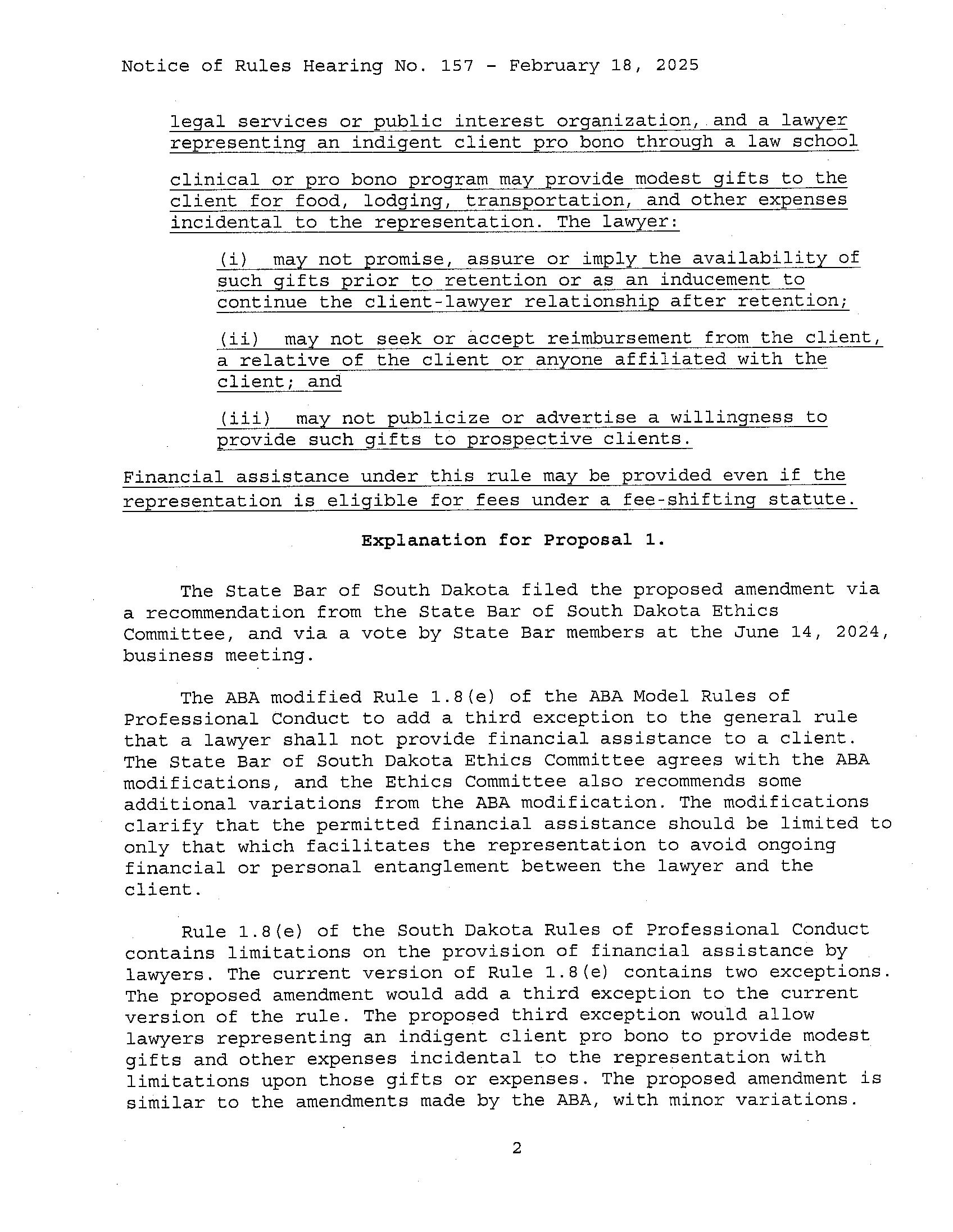


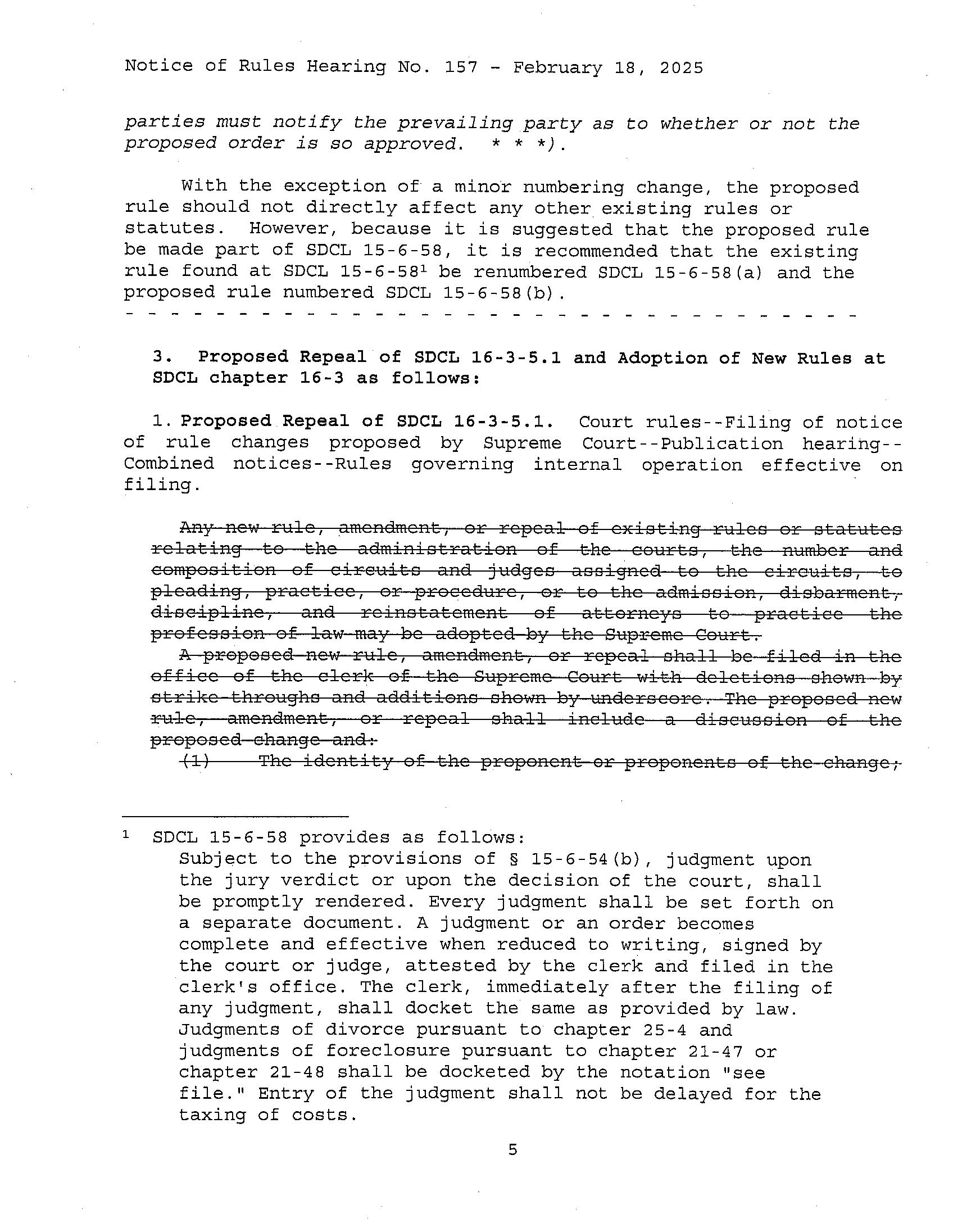

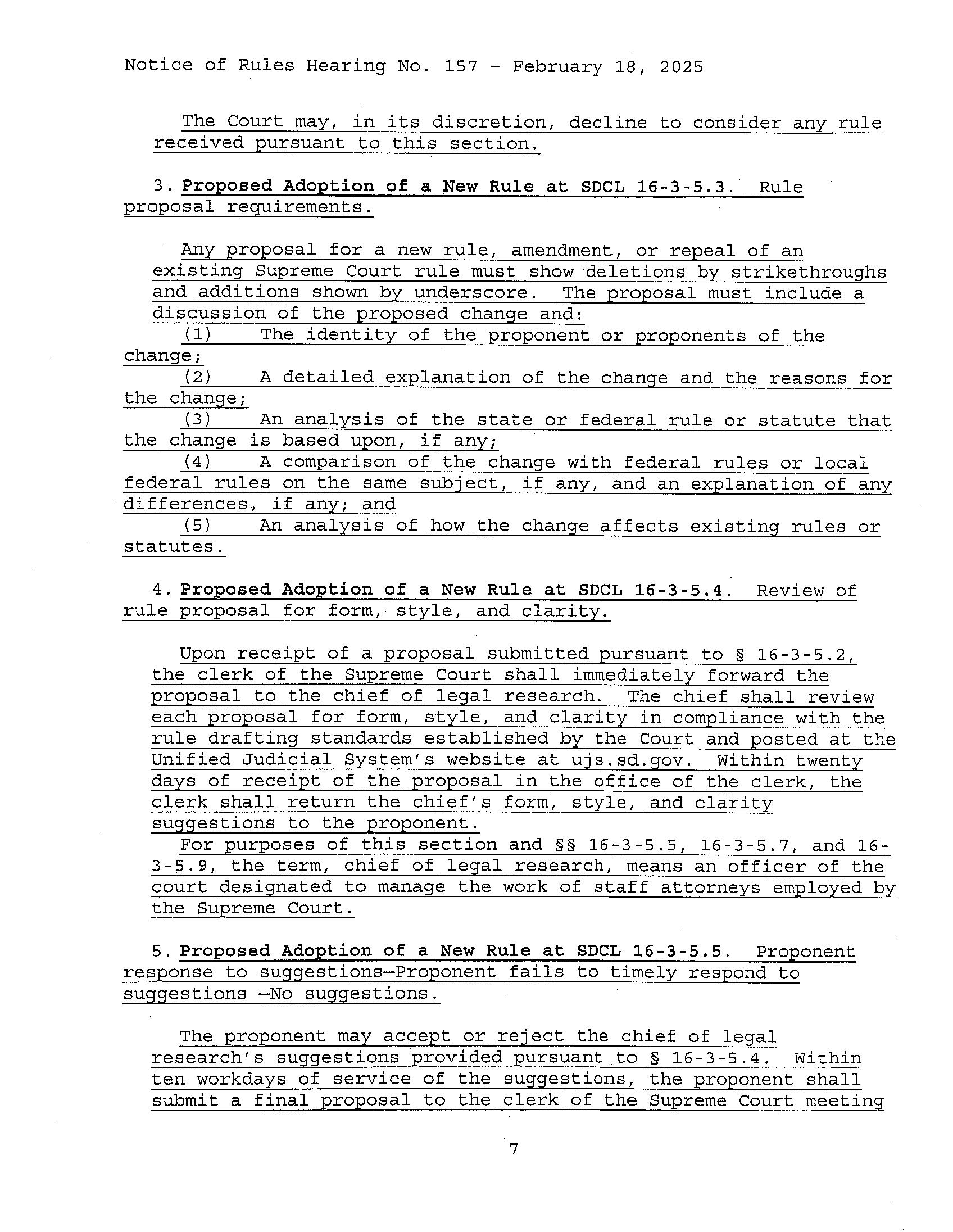

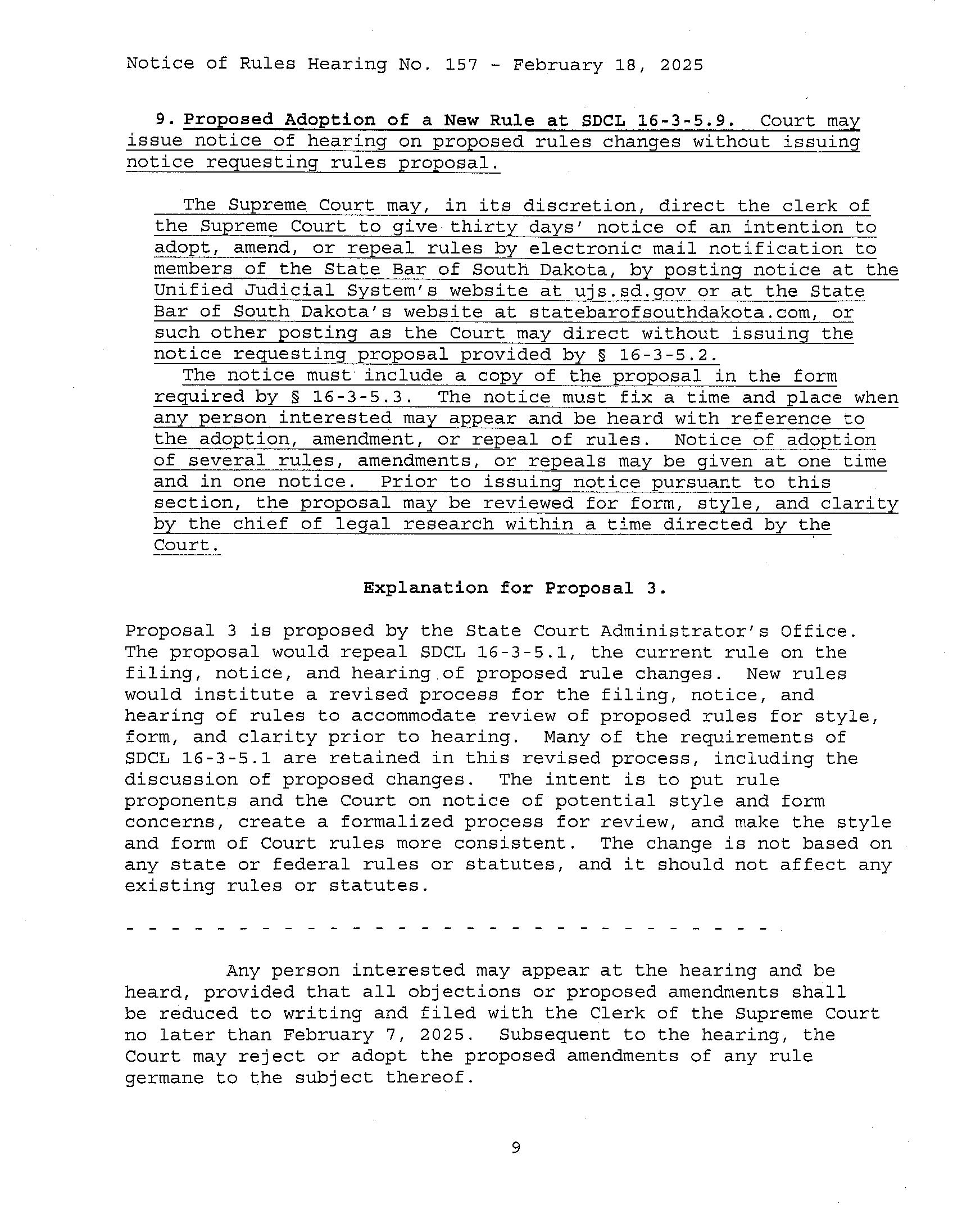
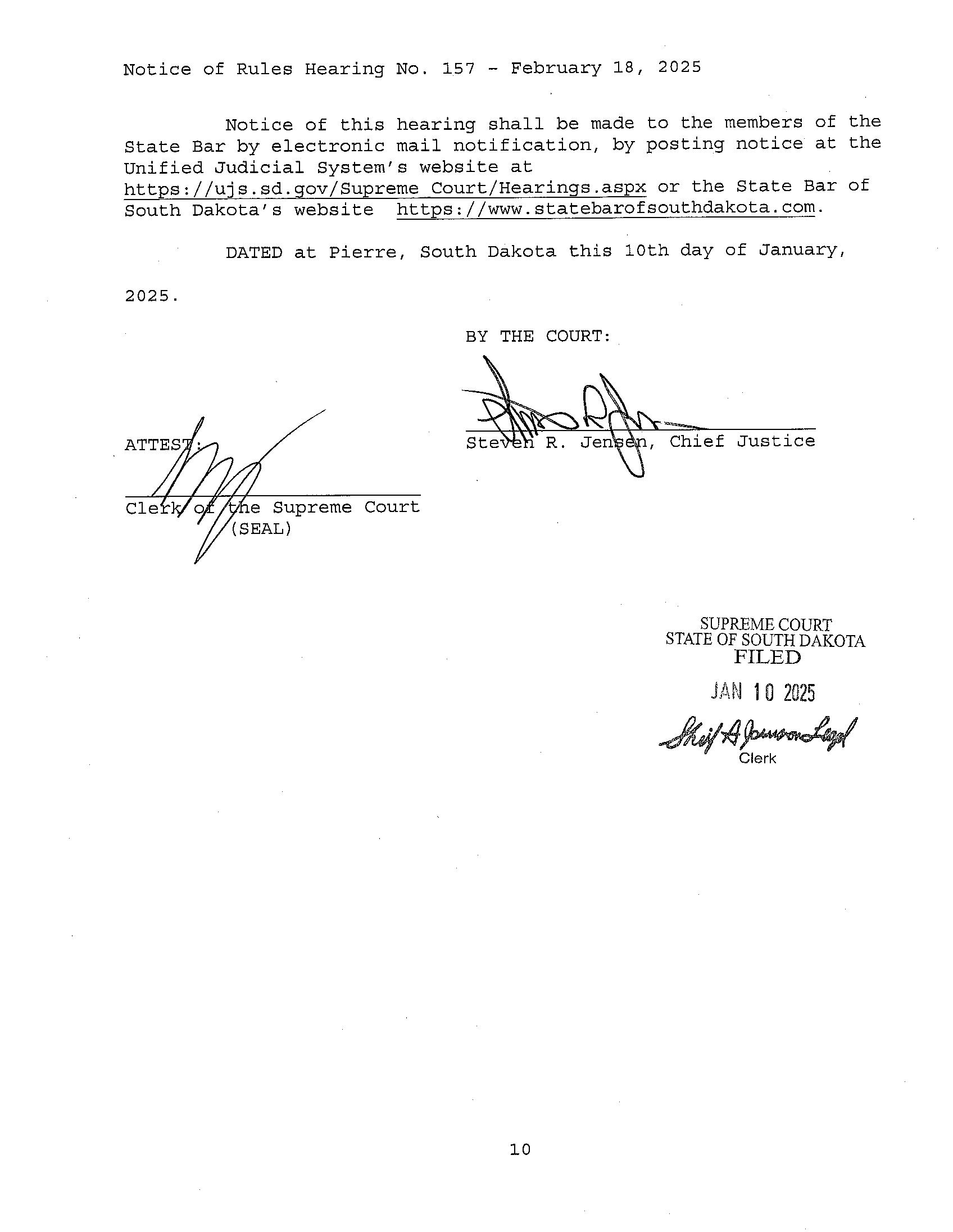

John J Simpson
September 2, 1931 –December 27, 2024
John Jerome Simpson, 93, Hot Springs, passed away on Dec. 27, 2024, at the South Dakota State Veterans Home, surrounded by members of his loving family.
John was born on Sept. 2, 1931, in Madison, S.D. to George and Kathryn Simpson, the youngest of six brothers. From early on, family members noted his quick mind and a contrarian nature. He learned to how argue from his parents and older brothers, who valued this skill. When just a little boy, he received a master class in storytelling at the knee of his grandfather, Casper Fergen, who homesteaded in South Dakota. He attended St. Thomas Catholic School and Madison High School, where he was a member of the 1949 Madison debate team, which won the state high school debate championship.
After high school, John studied history at St. John’s University in Collegeville, Minn., and the University of South Dakota, graduating in 1953. That same year, he followed in the footsteps of four of his brothers who served in WWII by enlisting in the Army, serving as a telegraph operator for the 370th Armored Infantry Battalion in Germany. His experiences overseas affected him deeply and inspired his daughter to also serve in the military. After his service, John used the GI Bill to attend law school at the University of South Dakota, graduating in 1958.
In 1958, John began work as an Assistant Attorney General in Pierre. In 1960, he moved to Gregory, to work with Dudley Herman in his private practice and live in prime hunting territory. In 1962, he opened his own practice in Winner, with the help of attorney Roscoe Knodell, who also helped him get elected Tripp County States Attorney in 1965 and 1967. John practiced law in Winner for over 50 years. He especially enjoyed representing juveniles and criminal defendants as a court-appointed lawyer. He had a soft spot for underdogs and often worked pro bono. He also taught
gifted education at St. Francis Indian School and served as a Tribal Judge for the Lower Brule Tribe. In his later years he researched and wrote three books on the history of Western South Dakota.
He loved reading (mostly history), watching sports, hunting pheasants with his labrador retrievers, planting huge gardens (especially tomatoes) and spending time with (and playing practical jokes on) friends such as “Pizza Tom” Falencik, Mike Winckler and Leo English. He enjoyed debating the merits of his cases and politics with colleagues like Stan Whiting and Mick Grossenburg at Sargent’s Cafe.
In 1967, John married Freya Meseck, and together they raised Mike, Kristina and Bob. He was a fantastic father. He never missed a game or school event. He coached sports teams. He used family dinners to teach his kids how to debate current events. He took his kids fishing and hunting and camping. His home was filled with hundreds of books, which he encouraged his kids to read and then discuss with him. When the kids left home, he kept in touch with regular phone calls, letters, and visits, always encouraging his kids to “keep going” through adversity. He inspired his kids by his constant efforts to improve himself and the world around him. He often told his kids to enjoy the little things in life and “make the journey something to enjoy in itself.”
Despite his many activities and interests, he was the world’s greatest dad to us.
When grandchildren entered the picture, John gave them the same love and attention he had given his kids. He was now “Grampy J”-outspoken, entertaining and a lot of fun. He beat them at cribbage, attended their plays, games and concerts, learned about iPhones and algorithms, and continued to “enjoy the journey.” He had a special relationship with each of them. He kept up to date on their latest accomplishments and whereabouts. Just like his grandpa, he made the past come alive through stories. As the grandkids said, “Grampy J is iconic.”
In 2014, at the age of 83, John’s health declined, and he moved to the State Veterans Home in Hot Springs. At that time, he could barely walk and there was serious concern whether he would make it much longer. In true Grampy J fashion, he vowed to “walk out of here,” which seemed very unlikely at the time. A year later, after
much hard work, he accomplished his goal. In 2015, he moved to Holiday Hills Estates in Rapid City, where he made many new friends (and listeners) and grew crops of tomatoes at the Canyon Lake Senior Center garden plot. In 2021, after a fall, his health declined, and he returned to the Veterans Home. At the age of 92 and in even worse health, he lobbied the Veterans Home to let him put raised beds in his room. In a few months, his east-facing window was filled with tomato vines, and soon he was sharing cherry tomatoes with his caregivers. Even as the end of his life drew near and his health worsened, he enjoyed the little things: the yellow blooms on a tomato plant, the sound of geese flying south, or the taste of some special cheese ordered off the internet. His last years at the Veterans Home were filled with many acts of kindness and love. The care he received at the Veterans Home was truly remarkable.
He is survived by his three children and their spouses, Mike (Marinell) Simpson of Rapid City, Kristina (Ken) Spearman of Avila Beach, Calif., and Bob (Johanna) Simpson of Sioux Falls. He also is survived by nine grandchildren: Scott (Joy) Thornburg, Rapid City, Jake Simpson, Washington, DC, Danny Thornburg, Rapid City, Shila Simpson, Flagstaff, Ariz., Halley Thornburg, Forest Lake, Minn., Jessa Simpson, Missoula, Mont., Jack Simpson, Los Angeles, Calif., and Alana and Zara Spearman, Avila Beach, Calif. He was preceded in death by his parents, his five brothers (Elwood, Jim, Gene, Vincent, and Father Maurus), his daughter-in-law Lori Simpson and granddaughter Macy Simpson.
John’s legacy will live on through his children, grandchildren, friends and all who crossed his path. He truly “made the journey something to enjoy in itself.” His death leaves a void that can never be filled, but his love, intelligence and sense of humor will continue to inspire all who knew him.
Funeral services are pending and will be announced.
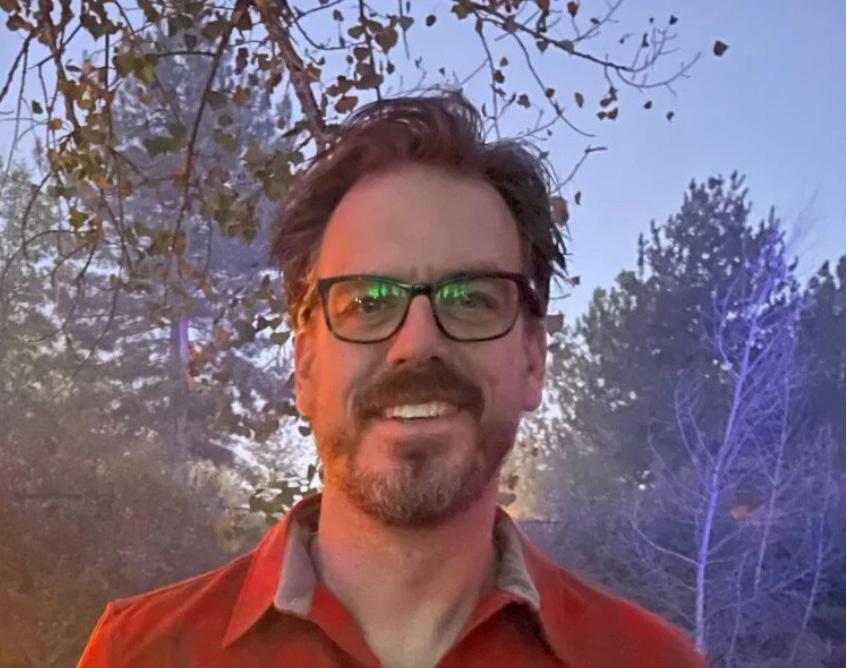
Lance Elton Shurtleff
Lance Elton Shurtleff passed away on December 31, 2024, at the age of 47. Born in Buffalo, Wyoming, Lance was the beloved son of Kent Shurtleff and the late Minnie (néeRoundtree). He carried the values of kindness, determination, and a deep sense of family that were instilled in him during his upbringing.
Lance graduated with his Bachelor of Arts degree from the University of Wyoming in 1999. He went on to attend the University of Wyoming College of Law, where he earned his Juris Doctor in 2002. Lance built a distinguished legal career and became licensed to practice in Colorado, Wyoming, North Dakota and South Dakota. He was a partner at the national law firm of Dinsmore & Shohl LLP, where he was known not only for his expertise and professionalism but also for the warmth and humor he brought to his work and colleagues.
Lance is survived by his devoted wife of 21 years, Kerri, and their cherished daughters, Lillian and Mila. He was an incredible father who brought light and love into their lives every day. Lance was steadfastly present for every milestone, from birthdays to school events, always making his daughters feel seen and celebrated. He shared a special bond with each of them, from skiing the snowy slopes of Winter Park with Lilly every winter to spending countless hours building intricate Lego creations with Mila during weekends.
To say Lance enjoyed music would be an understatement. Music was a cornerstone of his life, filling their home with joy and connection. His vast collection of albums reflected his diverse tastes and passion, and he had a knack for sharing his favorite songs with those he loved. Live music brought him even greater happiness, and he often attended concerts with family and friends. He never missed a Denver show of his favorite artists, including the Black Crowes, Jason Isbell, and the DriveBy Truckers. These moments created unforgettable memories of shared laughter and joy.
Lance is also survived by his father, Kent; his brother, Gavin (Anna); and his nephews, Clancy Lane and Gunner Wade. He had a special relationship with his extended family, including his many aunts, uncles, and cousins, who enriched his life with love and connection. He is preceded in death by his mother, Minnie, and his uncles, Clayton Roundtree and Mike McGrath.
A reception to celebrate Lance’s life will be held in the spring. Family and friends will gather to honor his legacy, share stories, and remember the remarkable man he was.
Anyone who wishes to honor Lance’s name is requested to make a contribution to his childrens’ college funds. All contributions will be transferred into their 529 College Savings Plan. Contributions can be made in the name of either child, in care of their mom, Kerri Anderson, P.O Box 2373, Littleton, CO 80161.
•Certified Consulting Meteorologist (CCM) Have a case where weather may be a factor? https://npweather.com/forms/CCM-article.pdf
•30+ years of weather/forecasting experience
•Consulting, reports, depositions, & testimony



•Specialties: forensic meteorology, slip and falls, heavy rain and flooding, high winds, fog, severe storms, hail, tornadoes, winter weather, heavy snow, icing, fire weather, weather-related accidents, agriculture weather, lightning verification, radar, and satellite https://npweather.com | nrnplnsweather@gmail.com



A very special

to Gunderson, Palmer, Nelson & Ashmore, LLP and Davenport, Evans, Hurwitz & Smith for sponsoring a lunch with legislative pages and interns.


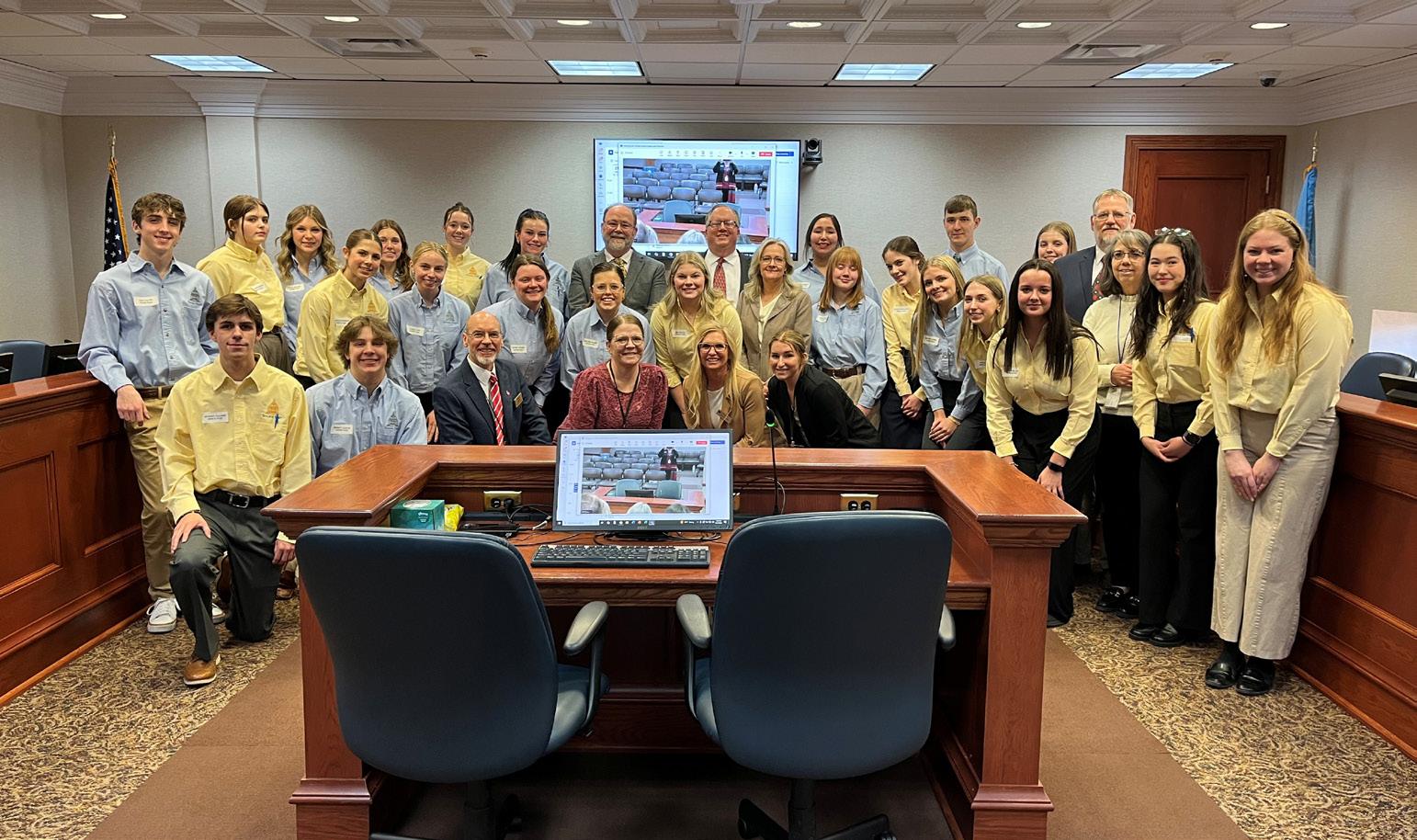
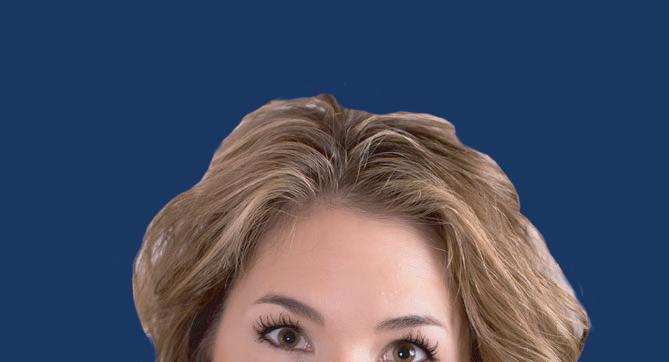
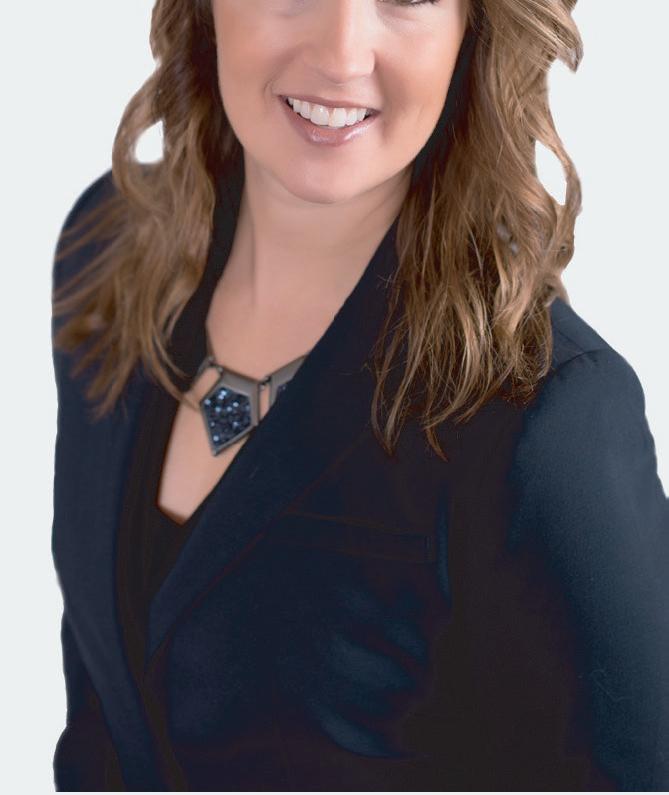


By:
Mark Bassingthwaighte, Risk Manager

Being an attorney is hard enough; but for some, it’s even harder during the winter months. In part this can be due to the reduced daylight, colder temps, and the stress that the holiday season can bring. So, let me be the first to acknowledge that when I was living in Montana it was always harder for me to eat right, keep up with my exercise regimen, and get enough sunshine during the cold and dark winter months. The good news is that it needn’t be this way.
Truth be told, years ago one of my responses to the darkness of winter was to take on a low mood that brought about a drop in my energy level. Over time I learned that the absence of sunlight was part of the reason this would happen. If your experience with winter is similar, recognize the situation for what it is and do something about it. You could invest in light therapy lamps that mimic natural sunlight, start to take short breaks during your workday to get outside to take in a little sun, or make sure your workspace is near a window in order to maximize your exposure to natural light.
For me things got really hard once the COVID lockdowns became part of our day-to-day lives because the lockdowns further exacerbated the “keeping up with my exercise regimen” problem. This situation was what got me to the point where I could finally say to myself
enough is enough, no more excuses.
If you find yourself making excuses regarding exercise, work to change that. The more active you become, the easier it will be to beat the winter blues. I started with cycling and have since added in tennis. What could it be for you? I know that making a change like this can be hard. Realize that it doesn’t need to be an all or nothing proposition, however. Just start. You might turn one of those short outside breaks mentioned above into a longer and longer walk or team up with one of your support systems and do something together. For example, play pickle ball with your spouse or go to the gym once a week with a friend. And always keep in mind Newton’s first law of motion. A body at rest tends to stay at rest, and a body in motion tends to stay in motion, unless acted on by a net external force. So, once you start, do all you can to make sure your mind doesn’t become an external force that prevents your body from staying in motion!
Now, it’s time for a confession. I don’t think I’ll ever understand the mindfulness movement. Perhaps it’s because I apparently lack the cognitive skill of being able to create and sustain a state of meta-awareness on the contents of my own mind in the present moment without conceptual reification. Man is that a mouth full!
Regardless, I have come to believe in the importance of
mindful eating. Trust me, I know what mindless eating is like and what it can do to one’s body. Comfort food is called comfort food for a reason, and it is so easy to embrace all that goodness, particularly when one is under stress or feeling down – a common response to the cold months of winter, the stress of the holiday season, the pressure of the end of the year workloads, and the list goes on.
What got me there was coming across a book a few years ago called “Wheat Belly.” Suffice it to say, that title described me to a T! Here again, I finally was able to realize that I needed to make a change and for whatever reason reading that book created my opportunity. Now, don’t get me wrong, I didn’t wake up the next morning forever more swearing off everything that had gluten in it. I simply decided to start to be mindful (think intentional) about my eating going forward. Protein became more of a go-to choice and portions became more reasonable. I slowly learned to replace bad carbs with good carbs and bad fats with good fats. Yes, I still enjoy the comfort foods now and again. I just don’t graze anymore, because I finally woke up to the reality that my body isn’t a garbage can. All this happened because I was open to finding my opportunity and I have felt better ever since. If unhealthy mindless eating happens to be a struggle for you as well, particularly doing the winter months, be open to finding your opportunity. It’s out there. All you need to do is look for it.
I could continue to share stories, stories that underscore the importance of social connections, getting a good
night’s rest, setting personal boundaries, nurturing support systems, and again, the list goes on; but my hope is these few have been enough to hit the mark. The point I am really trying to make is this. Each of us is on our own journey, a journey that will have all kinds of unique twists and turns. During my own journey, one of the things I learned was the importance of recognizing and taking advantage of the opportunities each twist and turn represented. The challenge was in daring to take advantage of the change opportunities life set before me. That was the hard part.
Now, hear me clearly. I’m not saying that I did all the work alone, never needing any help. I can assure you at times I most certainly did. What I am saying is that every decision to change had to start with me. I had to decide to take that first small step each and every time. What I found was that once I started to move, keeping the momentum up wasn’t as hard as I thought it would be. The same can be true for you. Will the path of change always be smooth and problem free? Nope. I have and will continue to stumble from time to time. All I can say is that’s life. When it happens, see it for what it is and just keep moving forward because finding wellness happens one step at a time.
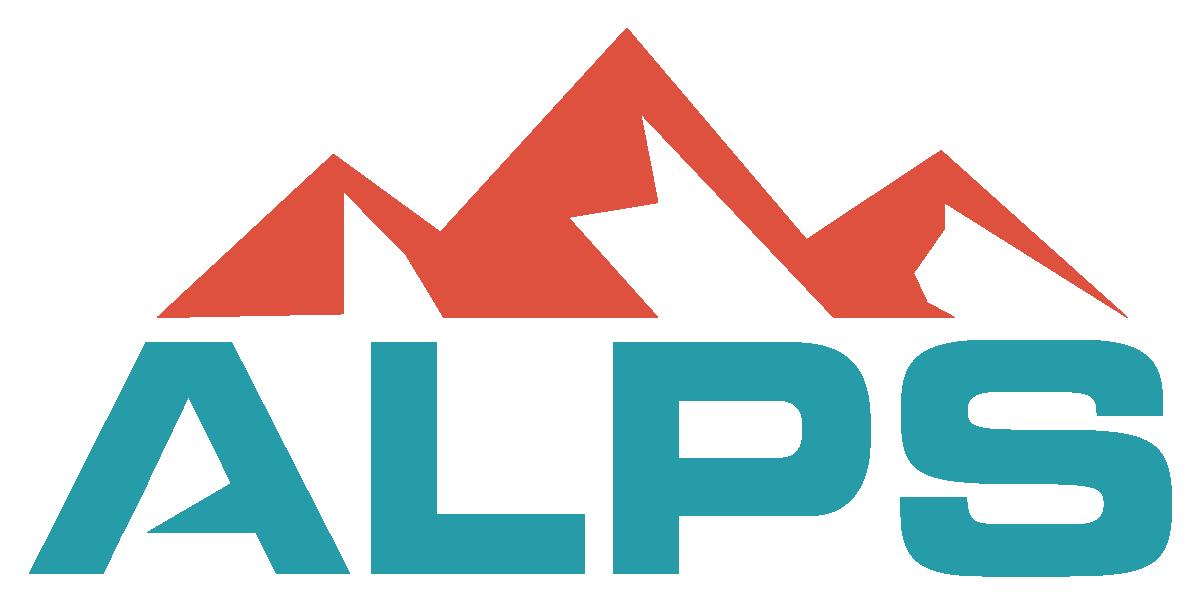

Authored by: Mark Bassingthwaighte, ALPS Risk Manager
Since 1998, Mark Bassingthwaighte, Esq. has been a Risk Manager with ALPS, an attorney’s professional liability insurance carrier. In his tenure with the company, Mr. Bassingthwaighte has conducted over 1200 law firm risk management assessment visits, presented over 400 continuing legal education seminars throughout the United States, and written extensively on risk management, ethics, and technology. Mr. Bassingthwaighte is a member of the State Bar of Montana as well as the American Bar Association where he currently sits on the ABA Center for Professional Responsibility’s Conference Planning Committee. He received his J.D. from Drake University Law School.
Emailyouremploymentannouncement to tracie.bradford@sdbar.net by to haveitincludedinthe newsletter.Pleasebesure to include a closingdate. To seemorejobslistings,visit www.statebarofsouthdakota.com
26th of each month next

The South Dakota Supreme Court and seven Circuit Courts
The South Dakota Supreme Court and seven Circuit Courts are recruiting for 2026-2027 Law Clerk applicants. If you are aware of any law students, either in-state or out-of-state, who may be interested in a one-year law clerk opening, please have them view the law clerk announcements online at https://ujs.sd.gov/ Careers/WorkForUs.aspx. There are currently law clerk openings in various locations, such as Pierre, Sioux Falls, Mitchell, Aberdeen, Brookings, Deadwood, and Rapid City.
• Supreme Court Law Clerk application deadline: May 30, 2025
• Circuit Court Law Clerk application deadline: May 30, 2025
This is a great opportunity to work for the South Dakota Supreme Court or South Dakota Circuit Courts. If you have any questions, please contact the Unified Judicial System Human Resources Office at 605-773-4884.
East River Legal Services (ERLS) is hiring a Managing Attorney for our Sioux Falls office, with experience supervising attorneys and support staff and building a cohesive team. Additionally, prior experience in one or more areas (Family, Housing, Consumer, Public Benefits) in which ERLS provides representation is highly sought after. ERLS is a non-profit law firm serving low-income individuals in the 33 eastern South Dakota counties.
East River Legal Services exists to better the lives of the over 52,000 people living in poverty in eastern South Dakota. We prioritize services to our most vulnerable citizens, including our community’s Veterans, older Americans (60+), people with disabilities, victims of crime, and all those facing financial insecurity.
Under the supervision of the Executive Director, the Managing Attorney provides high quality legal services to low-income individuals. The Managing Attorney will supervise, evaluate, and handle personnel-related matters for staff in the legal department. They also manage and monitor progress on implementing the program’s mission, priorities, principles of advocacy, and various work plans. The Managing Attorney also maintains an active caseload and/or other advocacy.
Client Representation and Advocacy:
• Provide and ensure high quality legal representation to individuals and groups in accordance with East River Legal Services (ERLS) standards of practice and supervision and the Rules of Professional Conduct. This includes interviewing clients, conducting research, performing factual investigation, preparing pleadings, negotiating case resolutions, executing discovery and motion practice, and representing clients in court and administrative hearings;
• Provide counseling, advice, and other brief services and referrals, as appropriate;
• Co-counsel with other Attorneys and work with Paralegals;
• Represent clients and client groups in litigation,
administrative advocacy, and other advocacy forums;
• Engage in appellate work, complex and major litigation, and other special projects;
• Develop and implement litigation and/or advocacy strategies to address systemic legal problems;
• Analyze and comment on pending legislation and regulations consistent with the requirements of all funding sources.
Leadership:
• Manage legal work in the office, including monitoring and regulating workloads;
• Supervise employees with ongoing feedback and performance reviews;
• Manage office systems such as conflict checks, filing, and workflow;
• Foster positive work relationships and promote cooperation within the program;
• Monitor case work of Attorneys to ensure that staff are operating efficiently and producing quality legal work;
• Monitor the balance of time spent by Attorneys on cases involving direct services to individual clients and to cases involving law reform, policy advocacy, or other legal work benefiting the larger population of low-income clients;
• Participate in management and administrative decision-making at ERLS involving personnel issues and program policy and help to implement such decisions;
• Provide supervision and evaluation of support staff assigned to the legal department, in coordination with the Executive Director;
• Supervise and enforce ERLS policies and procedures;
• Convey staff concerns about relevant office issues to management staff;
• Keep program staff apprised of important issues and new developments in the community;
• Keep program staff apprised of new developments within the substantive legal areas in which the Attorney practices (updates via written communication and/or training);
• Engage in local, state, regional and/or national legal services and the advocacy community.
• Participate in other activities related to poverty law including community education, outreach, writing of publishable materials, and permissible legislative
and administrative advocacy, in accordance with Legal Aid policy and applicable laws and regulations;
• Participate in Legal Aid and state-wide task forces and work groups;
• Participate in bar activities and establish effective working relationships with the bar;
• Ensure Legal Aid develops and maintains relationships with partner organizations, including the private bar and judiciary, other non-profits, grass roots organizations, government agencies and elected officials.
• Compliance with LSC, VOCA, and other funding agencies’ rules and regulations;
• Participate in training activities as trainee or trainer for professional growth;
• Report to Legal Aid management any bar association grievances, disciplinary proceedings, or malpractice claims involving their practice and cooperation with Legal Aid’s liability insurers;
• Attend program meetings and ensure office meetings are efficient and productive.
• Juris Doctor (JD);
• License to practice law in South Dakota;
• Experience in a legal services/non-profit environment is preferred, but not required;
• Working knowledge of recent developments in state and federal cases, statutory, and regulatory law related to the interests of Legal Aid’s clients;
• Excellent organizational, cross-cultural communication skills;
• Proficient at the use of technology including, but not limited to: word processing, spreadsheets, internet-based programs, and computer-based legal research;
• Excellent written and communication skills;
• Ability to work constructively with others;
• Excellent management and leadership skills;
• Ability to work effectively as part of a team and independently;
• Able to establish effective working relationships with a variety of individuals;
• Organized, able to prioritize work, plan and problem-solve, meet deadlines, and work well under pressure;
• Skills and experience in interacting with persons of various social, racial, cultural, economic, and
educational backgrounds;
• The ability to speak more than one language is a plus, but not required.
Classification:
Classified as an exempt employee.
Salary:
Starting at $75,582.72 to 111,670.09, depending on experience.
Benefits include 14 paid holidays plus a birthday holiday, vacation leave, sick leave, health insurance, dental insurance, vision insurance, life Insurance, AD&D Insurance, IRA, and travel reimbursement.
ERLS’ Sioux Falls office is open Monday-Friday from 8am-5pm. We close from 12:00pm-1:00pm for lunch.
To Apply:
Please send a cover letter, resume, and references to:
Melissa Frericks Director of Operations
East River Legal Services 335 North Main Avenue, Suite #200 Sioux Falls, SD 57104 Melissa@erlservices.org
Submission Deadline: Open until filled
South Dakota offers reciprocity for the following surrounding states: Minnesota, Iowa, Nebraska, North Dakota, Missouri, Kansas, Wisconsin, and Colorado. Want to relocate to South Dakota for this position? We would love to have you! Check to see if South Dakota offers reciprocity for your state at: https://barreciprocity. com/south-dakota-bar-reciprocity/
East River Legal Services is an Equal Opportunity Employer. Persons of color, veterans, persons with disabilities, and persons from other traditionally underrepresented communities are strongly encouraged to apply.
Sabers & Smith LLP
Loos, Sabers & Smith LLP, is seeking to hire an associate attorney. The practice area is litigation, with particular needs in the area of domestic relations. Two-plus years of experience is preferred, but not required. Strong writing and advocacy skills are a must. Confidential inquiries can be sent to Sara Owens at the address below or via email to Sara@clslawyers.net.
2834 Jackson Blvd, Ste 201 Rapid City, SD 57702
The ACLU’s National Chapter of North Dakota, South Dakota, and Wyoming seeks applicants for the full-time position of Legal Director in Sioux Falls, SD or Fargo, ND. This is a hybrid role that has in-office requirements of two (2) days per week or eight (8) days per month.
Apply here: https://www.aclu.org/careers/ apply/?job=7770646002&type=national
Reporting to the Executive Director of the Dakotas/ Wyoming Chapter, the Legal Director will lead and expand the ACLU legal program across South Dakota, North Dakota, and Wyoming, including developing and litigating high-impact cases and managing the legal department. At the direction of the Executive Director, the Legal Director will be responsible for crafting and executing legal strategy that advances the ACLU of SD/ ND/WY mission, as well as handling the day-to-day management of legal staff and cooperating attorneys. As a critical member of the office’s senior leadership team, the Legal Director will provide strategic leadership on both litigation and non-litigation legal advocacy in priority areas of criminal justice, immigrants’ rights, Indigenous justice, LGBTQ and Two Spirit equality, reproductive rights, and voting rights, as well as other areas including First Amendment rights.
We are seeking a dynamic and strategic Legal Director who will lead all aspects of litigation and serve as a key senior leader within our Chapter. The ideal candidate will demonstrate a strong commitment to legal advocacy and strategic leadership, contributing significantly to the
Chapter’s culture, management, and overall direction. Key responsibilities and qualifications include:
Strategic Leadership: Provide leadership in both litigation and non-litigation legal advocacy, playing a crucial role in shaping the Chapter’s legal strategies and broader organizational goals
Team Management and Collaboration: Proven ability to manage and inspire high-performing legal staff and teams. Coordinate effectively with advocacy, communications, and development teams to ensure cohesive, cross-functional success
• Manage, supervise, and direct a staff attorney and occasionally law student and undergraduate interns; handle recruiting and hiring of additional legal staff (budget permitting); and foster an organizational culture within the legal program that encourages staff development through internal and external resources.
• Coordinate and collaborate with other ACLU SD/ ND/WY departments on cross-departmental projects, ensuring integrated – and maximally effective – outcomes. Serve as a resource on legal matters for staff, partners, and other ACLU of SD/ ND/WY constituents.
• Direct Litigation Expertise: Engage in direct litigation efforts and manage cases demonstrating self-sufficiency and expertise in legal proceedings.
• Maintain and continue to develop our impact litigation and advocacy docket, which advances the ACLU of SD/ND/WY strategic priorities and responds to civil rights and civil liberties threats.
• Manage all aspects of the litigation program, including coordinating the selection of cases, overseeing the investigation and development of cases before commencing litigation; building litigation teams with in-house lawyers, private lawyers, and nonprofit partners; directly engaging in litigation in federal and state court; and overseeing ongoing litigation.
• Maintain an individual caseload of developing and active litigation and amicus briefs, including overseeing and directing pre-litigation investigations, discovery, motion practice, brief writing, hearings and trials, and appellate work.
• Work with staff attorneys, cooperating attorneys, and co-counsel (including but not limited to attorneys from the ACLU’s National Legal Department) on all work within the ACLU SD/ND/WY legal program.
Community Engagement: Develop and nurture strong relationships with community leaders, members, and organizations, both within legal circles and the broader community
• Broaden and deepen relationships with volunteer attorneys and other lawyers in the community to ensure the visibility of the ACLU SD/ND/WY in the legal community (and beyond) and to help build our legal docket, including by engaging lawyers in prelitigation investigations, amicus briefs, litigation, and other ACLU SD/ND/WY activities.
• Develop relationships with stakeholders such as community members, allied organizations, coalitions, and community leaders in SD/ND/ WY who may be impacted by current and future litigation.
Public Representation: Act as a prominent spokesperson for the Chapter, representing the organization in media appearances, strategic public forums, community events, donor briefings, and other public engagements
• Be committed to advancing the mission of the ACLU
• Center and embed the principles of equity, inclusion and belonging in their work by demonstrating commitment to diversity with an approach that respects and values multiple perspectives
• Be committed to work collaboratively and respectfully toward resolving obstacles and conflicts
• Significant years of trial and appellate litigation experience in state and federal courts, including class actions, with a strong interest and experience in constitutional law and civil rights
• Proven ability to effectively manage legal staff, run diverse and high-performing teams, and savviness in both direct and indirect people leadership with the ability to work effectively in coordination with nonlegal teams engaged in advocacy, communications, and development
• Admitted to the South Dakota, North Dakota, or Wyoming Bar or eligible for admission on motion
• Excellent organizational skills and a creative and strategic approach to problem-solving and litigation
• Creative, persuasive, results-oriented, self-starting, persevering, and willing to learn
• Ability to engage in litigation with minimal support staff
• High ethical standards and genuine interest in developing authentic relationships
• Team player who inspires collaboration, lifts the work of others, and maintains balance and perspective with patience
The ACLU is committed to equity, transparency, and clarity in pay. Consistent with our compensation philosophy, there is a set salary for each role based on geographic work location. The annual salary for this position is $116,756 (Level E), reflecting the salary of a position based in Sioux Falls, SD. Salaries are subject to a regional pay adjustment if authorization is granted to work outside of the location listed in this posting. For details on our pay structure, please visit: https:// www.aclu.org/careers/ACLU_Geographic_Pay_ Structure-July_2024.pdf
For over 100 years, the ACLU has worked to defend and preserve the individual rights and liberties guaranteed by the Constitution and laws of the United States. Whether it’s ending mass incarceration, achieving full equality for the LGBTQ+ community, establishing new privacy protections for our digital age, or preserving the right to vote or the right to have an abortion, the ACLU takes up the toughest civil liberties cases and issues to defend all people.
We know that great people make a great organization. We value our people and know that what we offer is essential not just their work, but to their overall wellbeing.
At the ACLU, we offer a broad range of benefits, which include:
• Time away to focus on the things that matter with a generous paid time-off policy
• Focus on your well-being with comprehensive healthcare benefits (including medical, dental and vision coverage, parental leave, gender affirming care & fertility treatment)
• Plan for your retirement with 401k plan and employer match
• We support employee growth and development through annual professional development funds, internal professional development programs and workshops
Accessibility, equity, diversity and inclusion are core values of the ACLU and central to our work to advance liberty, equality, and justice for all. For us diversity, equity, accessibility, and inclusion are not just checkthe-box activities, but a chance for us to make longterm meaningful change. We are a community committed to learning and growth, humility and grace, transparency and accountability. We believe in a collective responsibility to create a culture of belonging for all people within our organization – one that respects and embraces difference; treats everyone equitably; and empowers our colleagues to do the best work possible. We are as committed to anti-oppression, anti-ableism, and anti-racism internally as we are externally. Because whether we’re in the courts or in the office, we believe ‘We the People’ means all of us.
With this commitment in mind, we strongly encourage applications from all qualified individuals without regard to race, color, religion, gender, sexual orientation, gender identity or expression, age, national origin, marital status, citizenship, disability, veteran status and record of arrest or conviction, or any other characteristic protected by applicable law.
The ACLU is committed to providing reasonable accommodation to individuals with disabilities. If you are a qualified individual with a disability and need assistance applying online, please email benefits. hrdept@aclu.org. If you are selected for an interview, you will receive additional information regarding how to request an accommodation for the interview process.
The City of Brookings, a Home Rule Municipality, submits this Request for Proposals (RFP) to qualified law firms or individual attorneys to provide legal services, including acting as City Attorney, on a contracted basis. Proposals must address the qualifications, experience, and approach to fulfilling the City’s legal needs. To be considered, proposals must address each of the points requested in the supporting document (located at: https://www.cityofbrookings-sd.gov/Bids.aspx), including rates and fees. Rates and fees will be considered based on qualifications after initial consideration.
The person serving as City Attorney must be a licensed, practicing attorney in good standing of the State Bar of South Dakota and a member of the South Dakota Municipal Attorneys Association. The City Attorney may be associated with a firm. However, one individual will be identified for this position or to oversee this position and will be accountable for the scope of services, notwithstanding the delegation of responsibilities within a firm.
Questions regarding this RFP should be directed to Paul Briseno, City Manager or Steve Britzman, City Attorney, at 605-692-6281 or pbriseno@cityofbrookings-sd.gov and britzmanlaw@brookings.net.
Submit proposals electronically or by hard copy by 4:00 p.m. on February 13, 2025, to: City Manager Paul Briseno City of Brookings 520 3rd Street, Suite 230 Brookings, SD 57006 Email: pbriseno@cityofbrookings-sd.gov
Major Crimes Deputy State’s Attorney, Pennington County
X Full-Time X Exempt
The Major Crimes Prosecutor assumes a pivotal role in addressing and prosecuting the most severe offenses within Pennington County. This role is focused on managing complex felony cases, such as homicides, child abuse, sex crimes, and assaults, to guarantee an unwavering commitment to justice in the most crucial issues affecting our community.
. ESSENTIAL FUNCTIONS:
• Represent the State throughout the entire criminal justice process, covering initial appearances, arraignments, motions hearings, and trials.
• Handle and oversee complex felony cases, with a primary focus on homicides, child abuse, sex crimes, and assaults.
• Coordinate and function as a lead attorney or counsel in highly complex cases, demonstrating the ability to navigate intricate legal matters.
• Demonstrate superior courtroom and advocacy
skills.
• Foster a collaborative and professional environment with support staff and investigative agencies.
AND/OR EXPERIENCE REQUIRED:
• Professional degree (Juris Doctor) Graduation from a college of law and attainment of JD or LLB.
• Be admitted to the South Dakota Bar Association or be eligible to waive into the South Dakota State Bar.
• Bring a minimum of seven years of experience in criminal law, substantial felony jury trial experience, and a proven track record of handling highlevel criminal cases independently with minimal supervision.
• Most work is performed indoors in an office where noise and interruptions often occur.
• Overtime hours may be required to meet project deadlines
• Ability to safely and successfully perform the essential job functions consistent with the ADA, FMLA, and other federal, state and local standards, including meeting qualitative and quantitative productivity standards
• Ability to maintain regular, punctual attendance consistent with the ADA, FMLA, and other federal, state and local standards
• This position frequently remains stationary for long periods of time and needs to occasionally move about inside the office to access file cabinets, office machinery, etc.
• Constantly operates a computer and other office productivity machinery such as a calculator, copy machine and printer.
• Must be able to move up to 20 pounds unassisted, and move 40 pounds with assistance.
• Must be able to communicate clearly and effectively on telephone, in-person and in writing.
Position Objective:
The role of a Deputy State’s Attorney is to work collaboratively with law enforcement in enforcing the laws in the jurisdiction of Pennington County. They represent the State of South Dakota in all stages of court proceedings.
Essential Functions:
• Reviewing law enforcement reports.
• Making criminal charging decisions.
• Presenting evidence at probable cause hearings, whether before the Court or Grand Jury.
• Representing the State of South Dakota at Initial Appearances and Arraignments.
• Representing the State of South Dakota at Status and Motion Hearings.
• Representing the State of South Dakota at Evidentiary Hearings.
• Making bond arguments at hearings before the Court.
• Conducting legal research and writing, and motion preparation.
• Abiding by all victims’ rights and assisting victims through the criminal justice system. Meeting with victims and other witnesses throughout the prosecution of cases.
• Preparing law enforcement officers, witnesses and victims for courtroom testimony.
• Preparation for and presentation of evidence at court and jury trials.
• Deputy State’s Attorneys routinely field phone calls from citizens and interested parties about criminal prosecutions.
• They are also responsible for updating and training law enforcement on relevant areas of the law.
• Deputy State’s Attorneys also represent the State of South Dakota at involuntary mental commitments, involuntary drug and alcohol commitments and fugitive proceedings.
• Deputy State’s Attorneys handle appeals from magistrate to circuit court, and initial habeas filings at the State level.
• The Deputy State’s Attorney assigned as the juvenile prosecutor acts as a liaison to the Juvenile Detention Alternative Initiative Committee (JDAI), and meets daily with this group to discuss alternatives to detention placements. This attorney works collaboratively with the Juvenile Services Center, the Department of Corrections and Court Services and prosecutes all stages of litigation for juvenile offenders.
• The Deputy State’s Attorney assigned to abuse and neglect prosecution represents the Department of Social Services (DSS) in all stages of litigation in civil proceedings against parents and guardians accused of abusing or neglecting their children. Works cooperatively with DSS, tribal representatives,
children’s counsel, Department of Corrections, law enforcement and Court Services.
• The Deputy State’s Attorney assigned to the Civil Division handles planning and zoning cases and assists the Civil Chief Deputy as the legal representative for all County Department Heads and the County Commission.
• The Deputy State’s Attorney assigned to Magistrate Court represents the State of South Dakota in misdemeanor cases (those punishable by up to one year in county jail.)
• The Deputy State’s Attorney and Senior Deputy State’s Attorney assigned to Circuit Court represent the State of South Dakota in the same manner as those assigned to Magistrate Court. In addition, these attorneys will represent the State in felony matters (ranging in punishment from two years in the State Penitentiary to life imprisonment.) These attorneys will also be assigned with one or more specialty courts. These attorneys may also be called upon to assist with law enforcement investigation, search warrants and visit crime scenes. These attorneys are also responsible for the presentation of evidence and cases to the Pennington County Grand Jury.
Experience and/or Education Required:
• Bachelor’s Degree from an accredited University.
• Juris Doctorate Degree from an accredited University.
• Membership in the State Bar of South Dakota.
Working Environment:
• Most work is performed indoors in an office where noise and interruptions often occur.
• Must walk to the Pennington County Courthouse for multiple daily court appearances in all weather, carrying multiple files.
• Overtime hours may be required to adequately prepare for jury trials and complicated hearings.
• Some travel may be required for training, meetings, mental commitment hearings and appearances as needed in other jurisdictions.
Physical Requirements:
• Must be able to frequently sit, walk, stand, bend, kneel, stoop, reach and lift, push or pull and manual dexterity is needed to type, write, use a calculator, and answer telephone.
• Must be able to walk two blocks multiple times a
day to court in all weather.
• Upper body strength is a requisite to lift/move a maximum of 20 lbs. unassisted to carry files to court.
• Ability to communicate effectively orally and in writing.
• The ability to talk and communicate both electronically and face to face.
US Probation & Pretrial Services Officer
District of South Dakota
Vacancy No.: 01-25
Number of Vacancies: 1
Location: Cheyenne River Reservation, Standing Rock Reservation, Aberdeen, or Pierre
Salary: CL 25-28 $48,890-$115,213 commensurate with qualifications
Employment: Permanent, Full-time
Closing Date: Open until filled, priority given to applications received by 01/24/2025
The U.S. District Court for the District of South Dakota is seeking a full-time Probation & Pretrial Services Officer on the Cheyenne River Reservation or Standing Rock Reservation, or in Aberdeen or Pierre. U.S. Probation and Pretrial Services Officers play an integral role in the administration of justice, community safety, conduct objective investigations, supervise defendants and persons under supervision, interact with collateral agencies, prepare reports, maintain a detailed written record of case activity, and present recommendations to the Court. Officers investigate and prepare bail and presentence reports for the Court and/or supervise defendants and persons under supervision to reduce risk to the community and foster lawful self-management.
• Establishes a working alliance with persons under supervision by developing a genuine helping relationship and providing unconditional positive regard, empathy, and a shared agreement on goals.
• Conducts investigations and prepares reports for
the Court to assist with detention and sentencing decisions.
• Provides accurate, thorough, and objective information along with best judgment to the Court for the issuance of individualized, fair, and equitable court orders.
• Implements and uses behavioral-based change work methods to achieve the goals of the case plan.
• Interacts with defendants and people under supervision using values such as affirmation, nonjudgment, openness, care, and respect.
• Assesses and identifies general risk, risk to do harm, needs, strengths, level of motivation, and imminence for defendants and people under supervision.
• Collaborates with community resources utilizing referrals when necessary.
• Monitors a person’s compliance with the conditions of release and/or supervision and reports to the Court any allegations of non-compliance.
• Develops collaborative strategies and/or interventions to promote lawful self-management.
• Communicates clearly and effectively, both orally and in writing.
• Documents and maintains detailed written records of meetings and case activity.
• Participates in annual safety training and adheres to the district’s safety policy.
• Embraces diversity among colleagues and communities served.
• At times, extensive travel to other locations within the district may be required.
• May be requested to perform additional duties and/ or projects as assigned
• Exercise sound judgment, maintain confidentiality, adhere to high ethical standards, and demonstrate integrity in fulfilling the district’s vision, mission, values, and strategic plan.
• Prioritize competing demands while maintaining a positive and professional demeanor.
• Exercise impartiality and discretion with defendants, persons under supervision, courts, justice partners, and communities.
• Ability to work a flexible schedule if needed, including nights, weekends, or holidays.
• Promote and maintain a positive work environment which encourages integrity, respect, individual and organizational growth, and a fulfilling work life.
Minimum Education Requirement Applicants must possess a completed bachelor’s degree from an accredited college or university. The degree must be from a field of academic study related to human relations and where knowledge was gained in understanding the legal requirements necessary to succeed as a probation officer.
For more information about this position, click the link. https://www.sdd.uscourts.gov/sites/sdd/files/01-25%20 Vacancy%20Announcement%20US%20Probation%20 %20Pretrial%20Services%20Officer%20CL%2025-28. pdf
The terms of employment will be set forth in the contract between the Associate Judge and the Justice Commission.
3. The Associate Judge must be of high moral character and integrity; must have never been convicted of a criminal offense for which punishment of imprisonment was imposed; must not have been dishonorably discharged from any Branch of Armed Services/; and, must be a member in good standing of the bar of any State or Federal Court.
4. And other duties assigned.
NOTE: The duties listed are not intended to be allinclusive. Duties assigned any individual employee are at the discretion of the appointing authority.
• The requirement for managing others does not exist.
Associate Judge
EQUAL EMPLOYMENT OPPORTUNITY EMPLOYER
POSITION: Associate Judge
FLSA STATUS: FT-Regular
DEPARTMENT: Ft Berthold District Court.
SALARY: DOQ
CLASSIFICATION: Non-Exempt
LOCATION: New Town, ND
OPENING DATE: October 2024
CLOSING DATE: Open until filled
POSITION SUMMARY: The Associate Judge conducts proceedings as assigned and shall preside over all civil, criminal and juvenile cases; and arraignments as needed.
ESSENTIAL DUTIES AND RESPONSIBILITIES:
1. The Associate Judge conducts proceedings as assigned and shall preside over all civil and criminal, and juvenile cases and arraignments as needed.
2. The Associate judge is a full-time position.
Knowledge
• Federal Indian Law
• Extensive knowledge of the laws, rules, policies and procedures that pertain to the applicable Tribal, State and Federal laws as applicable to the MHA Nation District Court
• Knowledge of the equipment and use of computers, office software and application, and general office equipment.
Skills
• Be able to research case law pertaining to decision making on a case.
• Skilled in interpreting judicial policies, rules, guidelines, procedures and must perform legal research.
• Effective oral, written, and interpersonal communication skills.
Abilities
• Analytical and decision-making ability.
• Juris Doctorate Degree from an accredited law school.
• Licensure as an attorney eligible to practice law in any State. Will consider applications from person eligible for licensure, but not currently licensed in ND.
• Experience in the practice of law which includes court experience.
• Job requirements include a license to practice law in any State and experience in Federal Indian law is preferable.
• Work may require irregular hours i.e., working after normal scheduled working hours, weekends and at night.
• Work is performed in a courtroom and an office setting. The work area is adequately lighted, heated and ventilated.
• Smoke free working environment.
• The ability to deal with demands of a stressful environment is recommended due to the nature of the subject matter.
• May be subject to confrontations in the process of assisting in resolving differing opinions.
• The necessary body functions typically require; sitting, standing, stooping, and walking, talking, hearing, seeing, feeling, reaching and fingering requirements of other reasonable methods that accommodate an individual in completing necessary functions of the job.
Note: The statements herein are intended to describe the general nature and level of work being performed by employees, and are not to be construed as an exhaustive list of responsibilities, duties, and skills required of personnel so classified. Furthermore, they do not establish a contract for employment and are subject to change at the discretion of the employer.
Preference will be given to bona fide American Indian applicants in accordance with TAT policies and Federal Indian regulations for such preference.
THE MANDAN, HIDATSA, ARIKARA TRIBES DOES NOT DISCRIMINATE ON THE BASIS OF RACE, COLOR, NATIONAL ORIGIN, SEX, RELIGIOUS PREFERENCE, AGE, HANDICAP, MARITAL STATUS, POLITICAL PREFERENCE, GENETICS OR MEMBERSHIP OR NON-MEMBERSHIP IN AN EMPLOYEE ORGANIZATION, EXCEPT
AS ALLOWED BY THE INDIAN PREFERENCE PROVISION OF THE CIVIL RIGHTS ACT OF 1964, AS AMENDED AND NORTH DAKOTA HUMAN RIGHTS ACT.
PERSONS OF INDIAN ANCESTRY WHO ARE AT LEAST 1/4 DEGREE AND WISH TO CLAIM INDIAN PREFERENCE SHOULD SUBMIT A COPY OF THEIR TRIBAL ENROLLMENT CERTIFICATE INDICATING THEIR DEGREE OF INDIAN BLOOD AND AGENCY ENROLLED.
All interested persons must submit the following information:
* TAT Application
* Copies of
-Diplomas/Certificates and Transcripts -Driver’s License & Social Security Card
-Indian or Veteran Preference documents (If applicable)
Submit all necessary information to one of the following addresses:
Three Affiliated Tribes/MHA Nation
Human Resource Department
404 Frontage Road
New Town, ND 58763
Phone# 701-627-4781
Fax# 701-627-2960
Job Services of North Dakota
P.O. Box 477
New Town, ND 58763
Phone# 701-627-4390
Staff Attorney - Pierre/Eagle Butte
Are you passionate about racial justice and holistic legal advocacy? Join our team, and make a long-term impact!
DAKOTA PLAINS LEGAL SERVICES (DPLS), a non-profit legal services program, has an opening for a Staff Attorney position in our Eagle Butte, South Dakota office. The Eagle Butte office serves the counties of Dewey, Haakon, Hughes, Potter, Sully, Stanley and Ziebach along with the Cheyenne River Reservation. This position follows a hybrid schedule, working in
office and remotely.
SALARY/BENEFITS: 70,000+ starting salary for attorneys with 2 or more years of experience. DPLS has an excellent fringe benefits package including generous leave benefits of 6 weeks paid leave, and 15 paid holidays. Employer paid employee insurance coverage (medical, dental, life, disability). DPLS observes a 34 hour 4-day work week and offers matching 401(k).
QUALIFICATIONS/RESPONSIBILITIES: Applicants must have a JD degree and be licensed to practice, or by reciprocity be able to obtain a license to practice, in South Dakota, or be qualified to take the next South Dakota Bar Exam; must be a bright, motivated, selfstarter; must have the tenacity to assume immediate practice responsibilities, including handling a significant caseload touching on many different areas of law with regular appearances in court; and must demonstrate an interest in poverty law and working with Native American and low income clients. Some same day travel is required.
APPLICATION INFORMATION: Please submit a letter of interest and resume to: Thomas S. Mortland, Executive Director, Dakota Plains Legal Services, PO Box 489, Mission, SD 57555, (605) 856- 4444, tmortland@dpls.org.
CLOSING DATE: Open until filled.
Native Americans, Women and Minorities are encouraged to apply. Dakota Plains Legal Services is an Equal Opportunity Employer.
Assistant State’s Attorney
($75,000-$110,000)
The Peoria County State’s Attorney’s Office is seeking an energetic attorney for the position of Assistant State’s Attorney. This office wants a lawyer with a passion for justice and the desire to make a meaningful difference in the lives of those in their community. This person will gain strong courtroom experience. Duties include meeting with law enforcement, witnesses, negotiating and prosecuting all types of cases from initial filing to bench and jury trials. Salary commensurate with experience; paid 711 license positions while in law
school or studying for the bar. Benefits include Loan Forgiveness Program, health, dental and life insurance, IMRF retirement, Deferred Compensation program, paid holidays, vacation, and sick leave, and paid ARDC dues. Please send cover letter and resume to Linda Hood, Office Administrator, at lhood@peoriacounty. org.
Reports to: Vice President for Legal and Compliance
Classification: Full time, Exempt
Summary/Objective
This position is a mid-level position, responsible for advising and representing Expansion Capital Group, LLC (“ECG”) in matters related to the collection of outstanding commercial debts and obligations. The Collections Litigation Attorney (“CLA”) will, at the direction of the Vice President for Legal and Compliance (“VPLC”), represent ECG in litigation and arbitration in South Dakota. The CLA will interface with counsel representing ECG in states other than South Dakota. The CLA will assist the VPLC in developing a commercial collections litigation and arbitration strategy and program, conduct legal research, advise, negotiate, and settle commercial debts and obligations.
• Assist the Vice President for Legal and Compliance (“VPLC”) in developing a commercial collections litigation and arbitration strategy and program.
• Partner with Recovery management team to ensure net liquidation rates are being met for various litigation segmentation.
• Stay updated on relevant laws, regulations, and precedents governing commercial debt collections practices.
• Conduct legal research in order to counsel ECG on debt collection strategies, compliance with relevant laws, and potential legal actions.
Compliance:
• Ensure compliance with federal, state, and local laws governing commercial debt collection practices.
• Stay informed about changes in legislation that may impact commercial debt collection procedures.
Legal Consultation:
• Assess the merits of pursuing legal action based on the circumstances of each individual account.
• Offer clear and timely information to ECG regarding legal strategies, potential outcomes, and associated costs.
Negotiation and Settlement:
• Negotiate with opposing legal counsel to reach settlements, repayment plans, or other agreements to resolve outstanding obligations amicably.
• Utilize effective communication and negotiation skills to maximize recovery while considering the financial circumstances of the customer.
• Maintain accurate, current, and detailed records of all interactions, communications, and legal actions related to each individual account.
• Prepare, review, and organize legal documents to ensure completeness and accuracy.
• Initiate legal proceedings in South Dakota by filing lawsuits or initiating arbitration when negotiations fail to achieve a satisfactory resolution.
• Cause external counsel representing ECG in states other than South Dakota to file lawsuits or initiate arbitration when negotiations fail to achieve a satisfactory resolution.
• Prepare and file legal documents, such as complaints, motions, and other court filings in South Dakota, ensuring compliance with procedural requirements.
• Represent ECG in court proceedings, trials, arbitration, and other legal proceedings in South Dakota related to commercial debt collection.
• Present compelling legal arguments, introduce evidence, and advocate for the client’s position to secure favorable judgments.
Assist with other assigned duties as necessary.
Required Education and Experience
• Juris Doctorate (JD) degree from an accredited law school.
• Admission to the bar in South Dakota.
• Prior litigation experience.
• Prior experience in commercial debt collection or
related field is preferred.
• Strong negotiation, communication, and analytical skills.
• Knowledge of commercial debt collection laws and regulations.
• Strong organizational skills and attention to detail.
• Excellent written and verbal communication skills.
• Ability to work independently and as part of a team.
This position does not have any supervisory responsibility.
This job operates in a professional office environment. This role routinely uses standard office equipment such as computers, phones, photocopiers, filing cabinets and fax machines.
The physical demands described here are representative of those that must be met by an employee to successfully perform the essential functions of this job. This is largely a sedentary role; however, some filing is required. This would require the ability to lift files, open filing cabinets and bending or standing on a stool as necessary.
This is a full-time position, and hours of work and days are Monday through Friday, 8:00 a.m. to 5:00 p.m. Occasional evening and weekend work may be required as job duties demand.
Please note this job description is not designed to cover or contain a comprehensive listing of activities, duties or responsibilities that are required of the employee for this job. Duties, responsibilities and activities may change at any time with or without notice.
Minnehaha County Deputy/Senior Deputy State’s Attorney
This position is in Sioux Falls, South Dakota. The Minnehaha County State’s Attorney’s Office is accepting applications for a Deputy/Senior Deputy State’s Attorney to join our team of prosecutors. Minnehaha County prosecutors are an integral part of
the criminal justice system closely collaborating with law enforcement, probation, parole, juvenile justice centers, and numerous community agencies. With a caseload that keeps you constantly engaged, our office provides an intriguing challenge for attorneys who want to make a difference in their community by helping victims of crime and ensuring due process for the accused. Even new attorneys have the opportunity to enjoy the excitement of hands-on courtroom trial work on a regular basis.
The hiring range is $3,596.80 - $4,068.00/biweekly DOQ, with full earning potential up to $4,954.40/ biweekly. Minnehaha County offers a competitive benefits package including health, dental, vision, and life insurance, a generous paid time off program, extended sick leave, retirement, and an employee assistance program. For a full list of qualifications and to apply visit: http://jobs.minnehahacounty.gov. Review of applications begins on February 10, 2025. EO/AA Employer. Contact Human Resources with questions at 605-367-4337.
with a diverse range of clients, from entrepreneurs to established businesses, providing legal guidance to support their growth and success. Applicants must be licensed in Iowa and able to obtain licensure in South Dakota and Nebraska. Candidates with an existing client base are encouraged to apply, though a willingness to develop business and build client relationships is equally important. Halbach|Szwarc attorneys are licensed across South Dakota, Minnesota, Iowa, Nebraska, and Wyoming and serve clients across the U.S. and internationally.
Responsibilities:
1. Entity Selection and Formation. Provide legal counsel to clients on business formation, includingselecting the appropriate legal structure, drafting formation and related governing documents.
2. Business Document Preparation: Draft and review various agreements, including purchase agreements, lease agreements, asset and real estate purchase agreements and related agreements.
Associate Attorney - Business
Company: Halbach|Szwarc Law Firm
Location: Hybrid Position based in Sioux City, IA
Position Type: Full-time
About Halbach|Szwarc Law Firm: Halbach|Szwarc Law Firm is South Dakota and Iowa’s newest full-service law firm, built on a hybrid platform with physical offices in downtown Sioux Falls, SD, and downtown Sioux City, IA. We are committed to delivering exceptional legal services across the United States and beyond. Guided by our core values of responsiveness, quality, integrity, and professionalism, our experienced team of attorneys and paralegals provides comprehensive legal solutions across various practice areas as a hybrid team.
Job Overview: We are seeking a talented and motivated attorney to join our business law team. The ideal candidate will have 3+ years of experience in business and corporate law, including entity formation, contract drafting, mergers and acquisitions, and related areas. This position offers the opportunity to work closely
3. Mergers and Acquisitions. Assist clients with structuring, negotiating, and closing mergers, acquisitions, and sales of businesses or assets, with an emphasis on small and closely-held familybusinesses.
4. Client Interaction: Provide exceptional client communication and service and maintain strong client relationships.
5.Business Development. Engage in efforts to develop new client relationships, build your network, and contribute to the firm’s growth.
6. Remote Collaboration. Work remotely and collaboratively using modern technology to meaningfully engage with clients and team members.
7.Stay Informed: Stay abreast of changes in relevant laws, regulations, and legal trends affecting business and estate planning law.
1. Juris Doctor (JD) degree from an accredited law school.
2. Undergraduate degree in business, economics, finance or accounting preferred, but not required.
3. 3+ years of experience practicing law with an emphasis on business law.
4. Strong understanding of business law and tax.
5. Excellent drafting and negotiation skills.
6. Strong self-starter with an ability to work independently and remotely, managing a caseload effectively and efficiently.
7. Willingness to engage in business development and foster long-term client relationships.
Benefits:
• Competitive salary commensurate with experience.
• Unlimited PTO.
• 13 paid holidays.
• 100% firm paid health insurance.
• 100% firm paid vision insurance.
• Monthly technology stipend with firm provided remote technology solutions.
• Bonus eligibility based upon performance.
• Competitive 401(k) and profit sharing.
• Paid continuing education expenses.
• Collaborative and positive work environment.
How to Apply: If you are a motivated, detailed oriented, and personable individual with a commitment to excellence and client service, we invite you to apply for the Business Associate Attorney position at Halbach|Szwarc Law Firm. Please submit your resume and a cover letter outlining your relevant experience to Alex Halbach at alexh@halbachlawfirm.com and Stefan Szwarc at stefans@halbachlawfirm.com
Halbach|Szwarc Law Firm is an equal opportunity employer and values diversity in the workplace. We encourage all qualified individuals to apply.
Associate Attorney - Criminal Defense
Company: Halbach|Szwarc Law Firm
Location: Hybrid Position based in Sioux City, IA
Position Type: Full-time
About Halbach|Szwarc Law Firm: Halbach|Szwarc Law Firm is South Dakota and Iowa’s newest full-service
law firm, built on a hybrid platform with physical offices in downtown Sioux Falls, SD, and downtown Sioux City, IA. We are committed to delivering exceptional legal services across the United States and beyond. Guided by our core values of responsiveness, quality, integrity, and professionalism, our experienced team of attorneys and paralegals provides comprehensive legal solutions across various practice areas as a hybrid team.
Job Overview: We are currently seeking a skilled and dedicated criminal defense attorney to join our team that can lead our criminal defense practice group. The ideal candidate will have 3+ years of experience handling criminal cases at the state and federal levels, including misdemeanor and felony cases. This individual will play a key role in advocating for clients’ rights and achieving favorable outcomes, whether through negotiation, litigation, or trial and will play a key role in developing and implementing our criminal defense practice strategy.
Applicants must be licensed in Iowa and able to obtain licensure in South Dakota and Nebraska. While candidates with an established client base are encouraged to apply, a willingness to develop business and foster new client relationships is equally important. Halbach|Szwarc attorneys are licensed across South Dakota, Minnesota, Iowa, Nebraska, and Wyoming and serve clients across the U.S. and internationally.
1. Client Representation: Represent clients in criminal cases, including conducting initial consultations, negotiating plea agreements, preparing for hearings, and providing defense during trials.
2. Case Management: Handle all aspects of a criminal case, including pretrial motions, discovery, plea negotiations, and trial strategy.
3. Court Appearances: Advocate for clients in state and federal courts during arraignments, hearings, trials, and sentencing.
4. Legal Research & Writing: Conduct thorough legal research and draft compelling motions, briefs,and memoranda.
5. Client Advocacy: Maintain strong communication with clients, keeping them informed and empowered
6. Business Development: Contribute to the firm’s growth through networking, fostering client relationships, and developing new business opportunities.
7. Collaboration: Work collaboratively with other attorneys, paralegals, and support staff in a hybrid/ remote work environment.
8. Stay Informed: Keep current on changes in laws and court rulings that could affect client cases orlitigation strategy.
Qualifications:
1. Juris Doctor (JD) degree from an accredited law school.
2. 3+ years of experience in criminal defense, including trial experience.
3. Strong leadership skills and the ability to build and mentor a team effectively
4. Excellent courtroom advocacy, negotiation, and communication skills.
5. Self-starter with the ability to work independently, manage multiple matters, and meet deadlines effectively in a hybrid work environment.
6. Willingness to engage in business development activities and foster client relationships.
Benefits:
• Competitive salary commensurate with experience.
• Unlimited PTO.
• 13 paid holidays.
• 100% firm paid health insurance.
• 100% firm paid vision insurance.
• Monthly technology stipend with firm provided remote technology solutions.
• Bonus eligibility based upon performance.
• Competitive 401(k) and profit sharing.
• Paid continuing education expenses.
• Collaborative and positive work environment.
How to Apply: If you are a motivated, detailed oriented, and personable individual with a commitment to
excellence and client service, we invite you to apply for the Business Associate Attorney position at Halbach|Szwarc Law Firm. Please submit your resume and a cover letter outlining your relevant experience to Alex Halbach at alexh@halbachlawfirm.com and Stefan Szwarc at stefans@halbachlawfirm.com.
Halbach|Szwarc Law Firm is an equal opportunity employer and values diversity in the workplace. We encourage all qualified individuals to apply.
Company: Halbach|Szwarc Law Firm
Location: Hybrid Position based in Sioux City, IA
Position Type: Full-time
About Halbach|Szwarc Law Firm: Halbach|Szwarc Law Firm is South Dakota and Iowa’s newest full-service law firm, built on a hybrid platform with physical offices in downtown Sioux Falls, SD, and downtown Sioux City, IA. We are committed to delivering exceptional legal services across the United States and beyond. Guided by our core values of responsiveness, quality, integrity, and professionalism, our experienced team of attorneys and paralegals provides comprehensive legal solutions across various practice areas as a hybrid team.
Job Overview: We are currently seeking a talented and experienced estate planning attorney to join our team. The ideal candidate will have 3+ years of experience in estate planning, probate, and trust administration, including drafting wills, trusts, and other estate planning documents. This individual will work closely with clients to develop tailored estate planning strategies, ensure smooth administration of estates, and help clients achieve their financial and personal legacy goals.
Applicants must be licensed in Iowa and able to obtain licensure in South Dakota and Nebraska. While candidates with an established client base are encouraged to apply, a willingness to develop business and foster new client relationships is equally important. Halbach|Szwarc attorneys are licensed across South Dakota, Minnesota, Iowa, Nebraska, and Wyoming and serve clients across the U.S. and internationally.
Responsibilities:
1.Estate Planning: Draft wills, trusts, powers of attorney, and other estate planning documents tailored to meet clients' needs.
2.Probate & Trust Administration: Guide clients through the probate process and assist with trust administration, including filings, asset management, and distributions.
3.Client Counseling: Meet with clients to discuss their estate planning objectives, explain legal options, and provide clear and responsive communication throughout the process.
4.Tax & Asset Strategies: Advise clients on tax planning, charitable giving, business succession planning, and strategies to minimize estate and gift taxes.
5.Business Development: Contribute to the firm's growth through networking, fostering client relationships, and developing new business opportunities.
6.Collaboration: Work collaboratively with other attorneys, paralegals, and support staff in a hybrid/ remote work environment.
7.Stay Informed: Keep current on changes in laws and court rulings that could affect client cases orlitigation strategy.
Qualifications:
1.Juris Doctor (JD) degree from an accredited law school.
2.3+ years of experience in estate planning, probate, and trust administration.
3.Strong drafting skills and attention to detail in preparing estate planning documents.
4.Knowledge of estate and gift tax laws, as well as trust and probate administration procedures.
5.Self-starter with the ability to work independently, manage multiple matters, and meet deadlines effectively in a hybrid work environment.
6.Willingness to engage in business development activities and foster client relationships.
Benefits:
• Competitive salary commensurate with experience.
• Unlimited PTO.
• 13 paid holidays.
• 100% firm paid health insurance.
• 100% firm paid vision insurance.
• Monthly technology stipend with firm provided remote technology solutions.
• Bonus eligibility based upon performance.
• Competitive 401(k) and profit sharing.
• Paid continuing education expenses.
• Collaborative and positive work environment.
to Apply: If you are a motivated, detailed oriented, and personable individual with a commitment to excellence and client service, we invite you to apply for the Business Associate Attorney position at Halbach|Szwarc Law Firm. Please submit your resume and a cover letter outlining your relevant experience to Alex Halbach at alexh@halbachlawfirm.com and Stefan Szwarc at stefans@halbachlawfirm.com.
Halbach|Szwarc Law Firm is an equal opportunity employer and values diversity in the workplace. We encourage all qualified individuals to apply.
Company: Halbach|Szwarc Law Firm
Location: Hybrid Position based in Sioux City, IA
Position Type: Full-time
About Halbach|Szwarc Law Firm: Halbach|Szwarc Law Firm is South Dakota and Iowa’s newest full-service law firm, built on a hybrid platform with physical offices in downtown Sioux Falls, SD, and downtown Sioux City, IA. We are committed to delivering exceptional legal services across the United States and beyond. Guided by our core values of responsiveness, quality, integrity, and professionalism, our experienced team of attorneys and paralegals provides comprehensive legal solutions across various practice areas as a hybrid team.
Job Overview: We are currently seeking a talented and experienced civil litigation attorney to join our team. The ideal candidate will have 3+ years of experience handling civil litigation matters, including business
disputes, employment litigation, contract disputes, construction claims, and similar cases. This individual will play a key role in representing clients through all phases of litigation, including pleadings, discovery, motion practice, mediation, trial, and appeal. Applicants must be licensed in Iowa and able to obtain licensure in South Dakota and Nebraska.
While candidates with an established client base are preferred, a willingness to develop business and foster new client relationships is encouraged. Halbach|Szwarc attorneys are licensed across South Dakota, Minnesota, Iowa, Nebraska, and Wyoming and serve clients across the U.S. and internationally.
Responsibilities:
1. Case Management: Handle all aspects of civil litigation, including drafting pleadings, conducting discovery, attending court hearings, and representing clients in depositions, mediations, and trials, with an emphasis on creative solutions.
2. Legal Research & Writing: Conduct in-depth legal research and prepare persuasive briefs, motions, and legal memoranda.
3. Client Communication: Provide responsive, clear, and professional communication with clients to build and maintain strong relationships.
4. Business Development: Contribute to the firm’s growth through networking, fostering client relationships, and developing new business opportunities.
5. Collaboration: Work collaboratively with other attorneys, paralegals, and support staff in a hybrid/ remote work environment.
6. Stay Informed: Keep current on changes in laws and court rulings that could affect client cases or litigation strategy.
Qualifications:
1. Juris Doctor (JD) degree from an accredited law school.
2. 3+ years of experience in civil litigation.
including depositions, motion and hearings and trial preparation
4. Exceptional legal writing, analytical, and research skills.
5. Self-starter with the ability to work independently, manage multiple cases, and meet deadlines effectively in a hybrid work environment.
6. Willingness to engage in business development activities and foster client relationships.
Benefits:
• Competitive salary commensurate with experience.
• Unlimited PTO.
• 13 paid holidays.
• 100% firm paid health insurance.
• 100% firm paid vision insurance.
• Monthly technology stipend with firm provided remote technology solutions.
• Bonus eligibility based upon performance.
• Competitive 401(k) and profit sharing.
• Paid continuing education expenses.
• Collaborative and positive work environment.
How to Apply: If you are a motivated, detailed oriented, and personable individual with a commitment to


out how you can post your open positions here!
Email: tailynn.bradford@sdbar.net
3. Proven trial and courtroom experience,
